
How Often Should You Travel?
We use affiliate links, and receive a small commission if you make purchases through them. Find out more here .
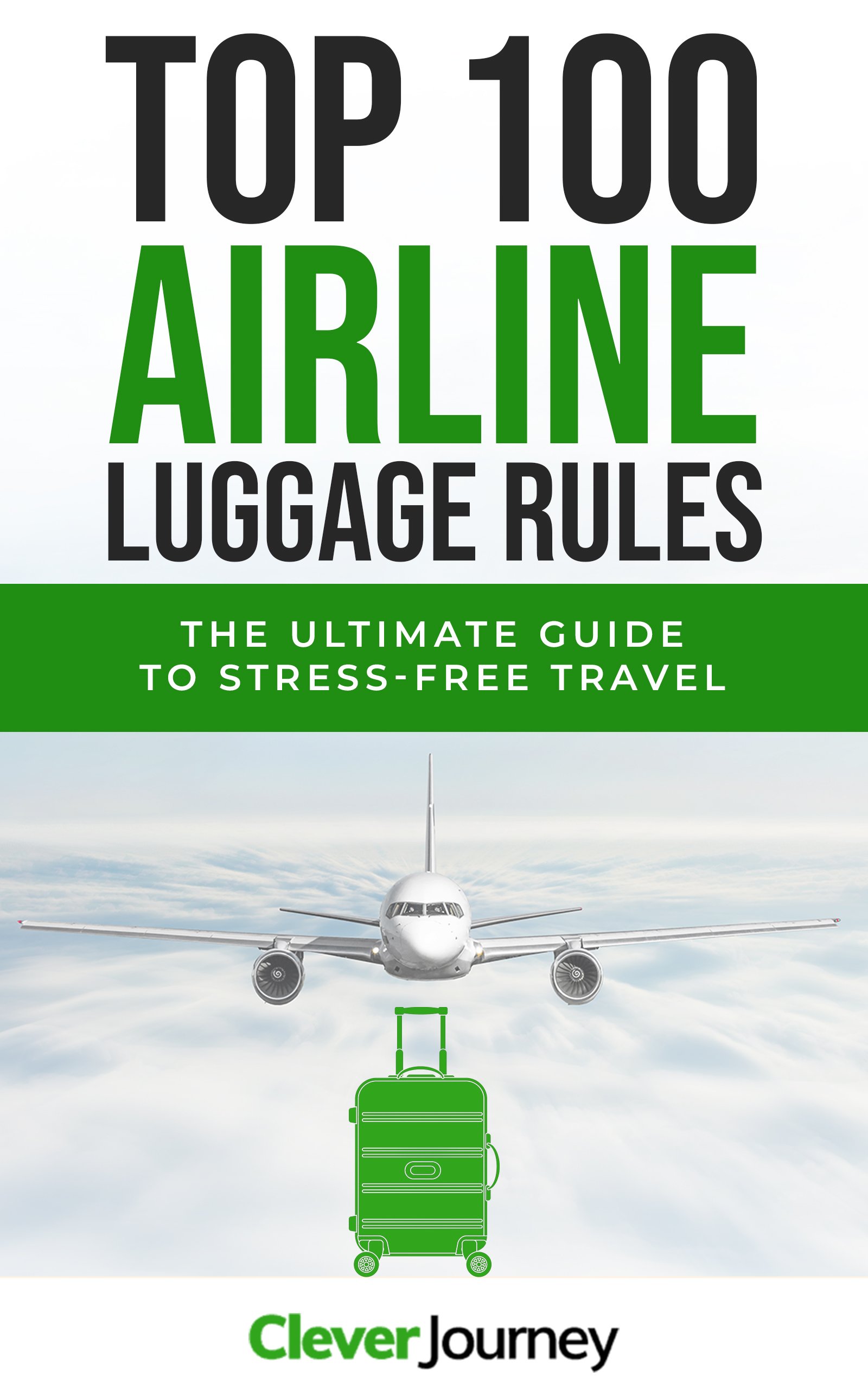
Unlock the Ultimate Guide to Airline Luggage Allowances
Don’t get caught off guard by unexpected baggage fees! With this comprehensive eBook, you’ll have all the information you need at your fingertips.
You have successfully joined our subscriber list.
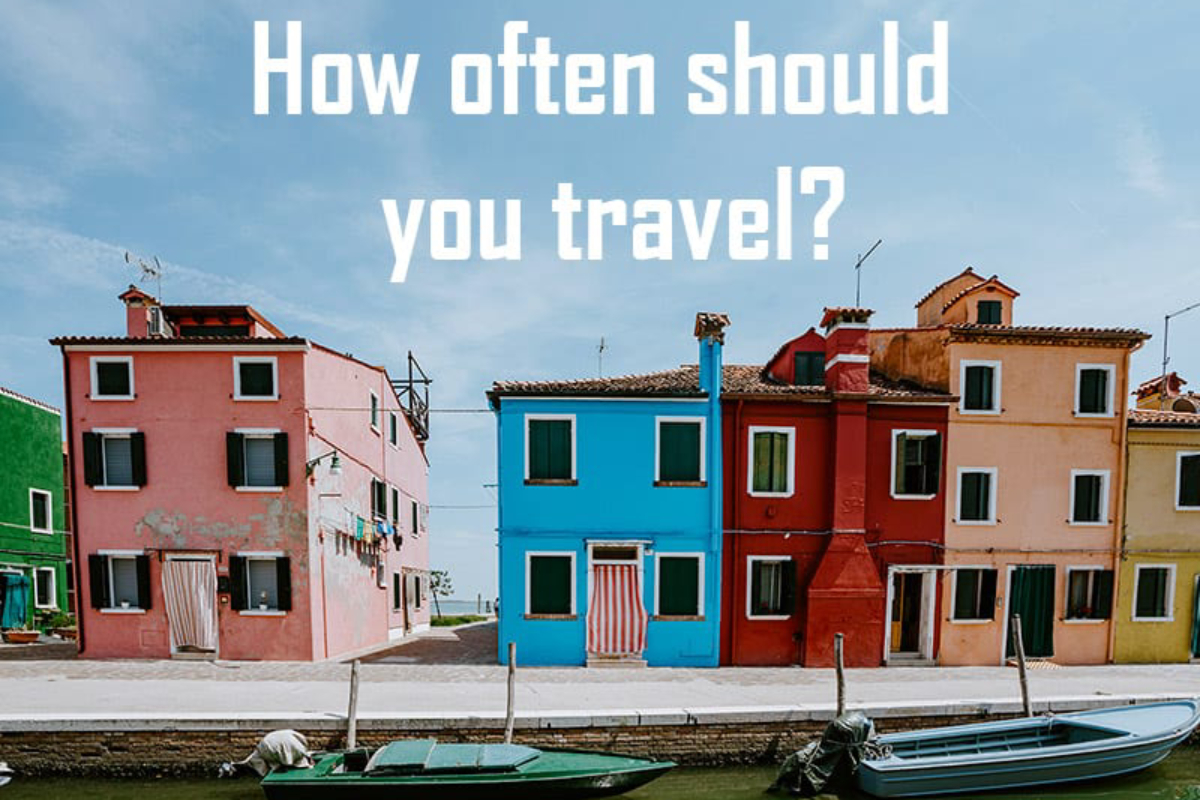
Maximizing Health and Longevity: The Importance of Regular Travel and Ideal Vacation Durations
First of all , in my opinion, you should be traveling at least once per year at a minimum. If you don’t use your vacation days to blow off steam in healthy ways, you could risk getting burned out.
Not only that, but a study published in Psychosomatic Medicine even suggests that lack of travel may actually shorten your life expectancy. According to this nine-year-old study, traveling less than once per year may increase the risk of cardiovascular diseases, which in turn shortens your lifespan. Take care of your mental health, and you’ll live longer.
Now that’s the minimum, but what’s the recommended amount that you should spend on a vacation?
Ideally, you should take at least two longer trips per year, in addition to a few other smaller trips. The total amount that you should spend on vacation is 30-45 days per year. I know getting one month off per year can seem hard for some, but it’s a very effective way to stay healthy, live happier, and longer.
So how should you space out these 30-45 days? Take at least two longer trips of 7-14 days and fill in some three to four-day trips across the year. Also, make sure to book your vacations mostly in Autumn and Winter, to escape the cold and depressing routine.
Here’s How Frequently I Travel
Personally, I would like to travel much more than I currently do. During 2017, I was abroad for about sixty days. The year before that – Only about a week, because I was working on a new company (which eventually failed).
When I compare the last two years, it becomes clear that 2016 was a very stressful time for me. I account for most of it due to burning out. In contrast, I’m pleased that I’ve improved the time spent abroad during 2017 because now I feel much happier and relaxed. P.S. I’m not the only one, most of you will feel much happier if you take some time off!
When I was trying to think of any happy moments in my life, I came to the conclusion that almost all of them were while traveling. That’s why I plan on finishing off 2018 with at least three months abroad. A goal of mine is to spend at least half a year abroad in the near future.
As I’m traveling more and more, I’m in a need of a carry-on that I can depend on. I’ve owned the Travelpro Maxlite 5 carry-on for a few years now, and I’m absolutely thrilled by it. If you’re looking for a carry-on yourself, make sure to check it out! (full review here)
How Long Should Your Vacation Be?
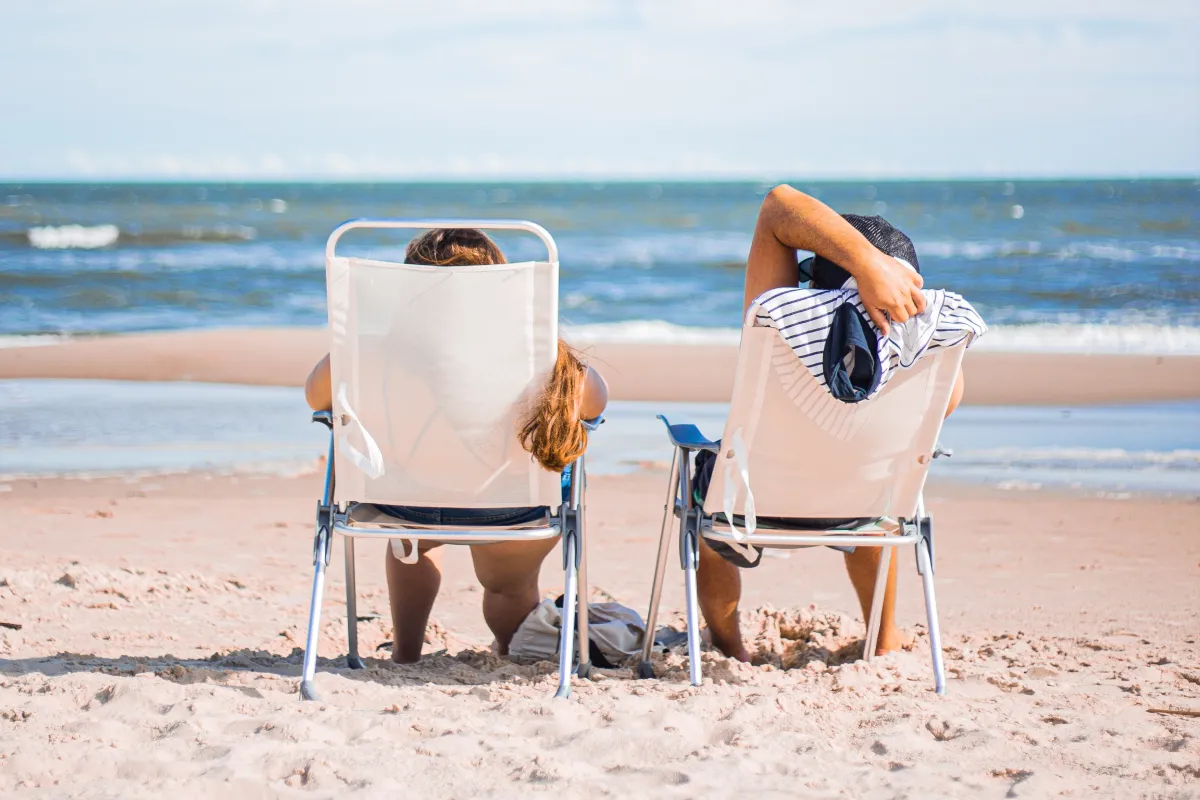
The study looked at many respondent’s experiences while on their vacations. The results were nothing short of interesting.
In the first four days, the ‘health and wellbeing of most participants improved dramatically. By the eighth day, health and wellbeing had peaked and then stalled for the remainder of the vacation. Once the vacation had ended, it returned to normal within the first week.
So what’s the takeaway? To get the most out of your vacation, it’s recommended to travel for a minimum of eight days.
From my personal experience, I’ve felt best on really long three-week trips. On trips that take this long, you really get to experience everything that you want to see and immerse yourself in their culture fully. Even two weeks feel a little short-handed for me.
Are Vacations Worth It?
I would answer this question with a resounding YES! As mentioned above, a good vacation is shown to lower stress, raise happiness, and ultimately contribute to improved health and wellbeing for the average holiday goer. Taking a break from the daily grind every now and then is essential, and a nice day at the beach or a night out with friends won’t always cut it.
The truth is that we don’t always realize how deeply stress affects us. Even outside of the workplace we may still feel the pressure of our workload and boss/colleague expectations weighing down on us.
That’s one of the great beauties of travel. It’s very hard to think about current projects when you’re sipping Mai Tai’s or hiking up mountains thousands of miles from your office. The further away you are, and the more radically different your new environment is, the easier it will be to mentally distance yourself from stress and give your mind a well-deserved break.
But that’s not the only reason you should take a vacation. Exploring new countries, cultures, and experiences will do wonders in changing your perspective and deepening your understanding of yourself and the world around you. Diverse travel, when done right, will go far in improving your life and making you a better world citizen.
Where Should You Go on a Vacation To?
An ideal vacation spot depends entirely on you: your personal taste, interests, and financial/personal means. While I can’t tell you exactly where to go, I can say that your best bet is finding a destination that fits somewhere between all of these criteria. A good way of figuring this out could be through a process of elimination, through questioning what your idea of a “dream” vacation might be.
Can you afford a luxury vacation to Switzerland, or will backpacking through Thailand be more faithful to your budget?
Are you looking for excitement or leisure?
Do you like a fast-paced or high adrenaline environment? Do you prefer cities or the countryside?
Asking yourself a series of realistic questions like these will quickly narrow down your options.
At the end of the day, knowing what is accessible and desirable to you, as well as doing A LOT of research is going to be your best bet. While it’s hard to go wrong if you head off on any holiday with a positive mindset, finding a place that you know you are likely to enjoy and take interest in is the first step to the vacation of a lifetime.
When Is the Best Time to Take a Vacation?
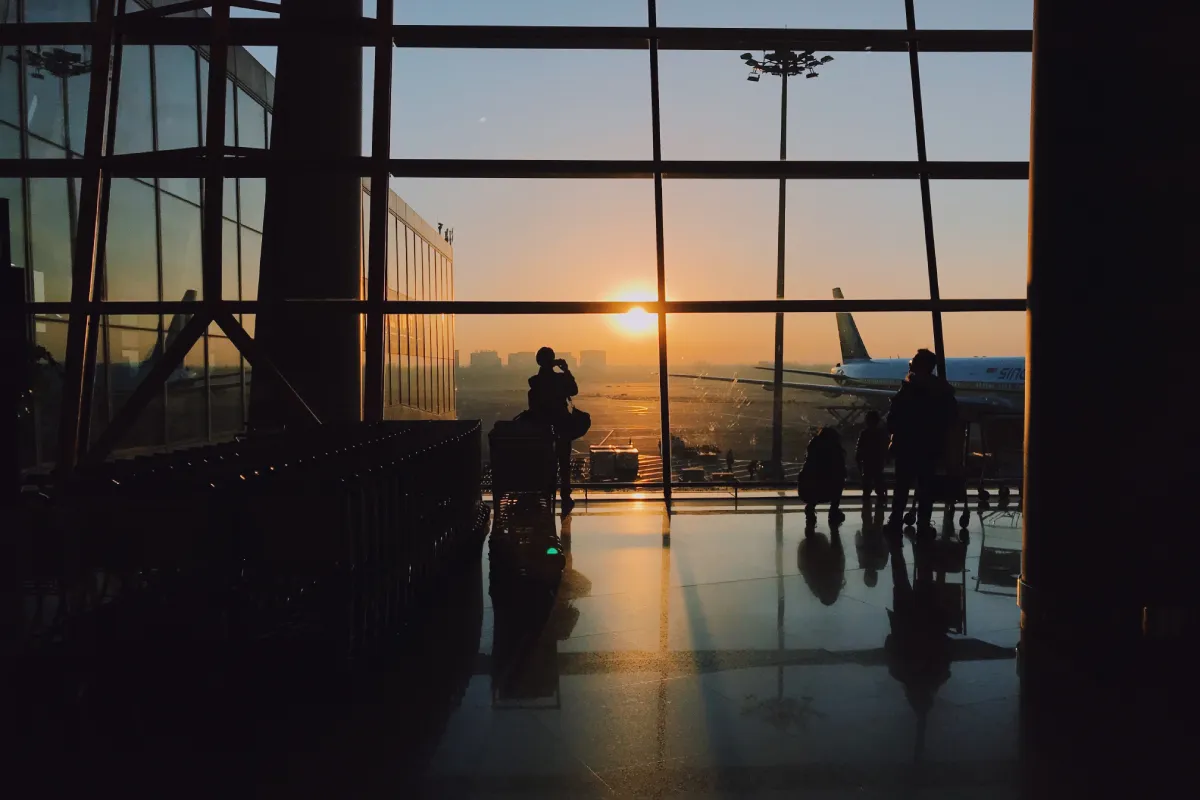
If you’re not flush with cash flying in the off-season (when tourist numbers are at their lowest) may be the best choice for you, as flight costs will be at their cheapest during these periods. If you like having the choice of meeting like-minded travelers, or ideal weather conditions are important to you, shoulder season may be a good compromise.
Just like choosing your destination, finding the best time for a vacation will require research more than anything. Every location’s premium visiting period will change according to the seasons, public holidays, local customs, etc. Read up through Google and Lonely Planet, and even consider posting your queries on travel forums to gain the perspective of more experienced travelers.
Why Is Traveling Good for Your Health
There are many things that are good for you , like eating healthy, sleeping, and regular exercise. But when it comes to taking care of ourselves, most of us overwhelmingly prioritize our bodies over our minds.
I’ve found that traveling is the best way to lower stress and improve overall happiness. And I’m not the only one; many studies have actually proven this.
Here are some of the benefits you can get from traveling:
- Creativity: Some studies have seen a link between creativity and traveling. This comes from experiencing different cultures and traditions, which in return trains your ability to adapt to new and unfamiliar situations.
- Stress relief: Traveling is basically mindfulness on steroids. Meditation teaches you to forget all about the past and future and experience only the current moment. Have you ever noticed that on your longer trips, after the first day or two you start to feel more relaxed? That’s the time it usually takes to forget about your everyday troubles and focus on the current experiences.
- Improved heart health: Let’s be real here, on average you’re probably not exercising that much. While traveling, you often walk for miles, climb steep mountains, and push through crowded tourist masses, all of which contribute to your physical fitness and improves cardiovascular health. Not only that, but the Framingham Heart Study concluded that women who take vacations once every six years or less are eight times more likely to develop heart disease, compared to those who travel twice per year.
How to Travel More Often
During the last year, I’ve been abroad for about two months. In the future, I plan on traveling at least six months per year. How have I managed to achieve this? By leaving my position in banking and gradually moving to something that allows working remotely, like blogging.
Now I know not all of you can just change your career at the drop of a hat just to travel more often. But it’s possible to travel one to two months per year if you’re smart about your decisions.
Here’s how you do it:
- Cheap destinations. When looking for your destination, look for less developed countries that are cheaper to travel in.
- Book your vacation early. Like, half a year early. Be on the lookout for cheap deals and flash sales. You can easily save at least half the cost of your flight and reservations by booking early.
- Travel in the off-season. Not only will the reservations be cheaper, but sometimes your airline tickets, costs of living, and entrance fees will be as well.
- Live minimalistic. I’ve managed to save around forty percent of my everyday costs by avoiding unneeded stuff. Also, I use public transport over cars, to save some money on transportation costs. Actually, by using public transport alone, you could save up for one additional vacation per year!
- Squeeze in some weekend trips. If a national holiday falls on Friday or Monday, man am I happy that I’ll get to go on a three-day trip. All while not missing any work.
- Consider changing your career. Before I was working in a bank. Not only was this job really stressful, but I also didn’t get many vacation days, and there weren’t any options for remote work. So I chose a different career, and it’s possible for you as well. Look for a job that allows you to work from home on some days or one that involves lots of business trips.
How to Travel With a Full-Time Job
The simple fact is that most of us are working full-time jobs in fixed locations. This can make traveling more than once a year seem like climbing to the peak of Mount Everest (and not necessarily in the exciting, adventurous way). But there are tips you can use to make it work.
Only a few months ago I was still working a nine-to-five job at a bank. It was extremely stressful, and the desire to travel was growing stronger by the day. So during the last few months of working there, I actually managed to be abroad pretty often.
Here’s how I did it:
- Make use of weekend trips: Nowadays, you can fly to a nearby country in just a few hours. If you book early, you can do it pretty cheaply as well. Look at surrounding countries or states, then go to Pinterest or Google and look for awesome destinations to visit there. If you take a Friday or Monday off you can enjoy your three to four-day trip.
- Don’t sacrifice your paid holidays: Be careful of how you spend your vacations. Try not to spend it watching Netflix on the couch or drinking your money and time away in overpriced bars. If you’re really passionate about seeing the world, you’ll use this valuable time to be abroad.
- Talk with HR about unpaid leave: Be honest and talk to the HR department. Say that you’re getting burned out and you feel that a longer unpaid leave would get you pumped up for further work. I actually managed to get two weeks off this way by talking to my manager.
- Chase opportunities for business trips: Are there any other positions that require more business travel? You could talk to HR about trying out participating in some of the business trips, as this would widen your experience and help you become a better employee.
Read Next: 30 Things to Do Before Traveling Abroad
Jobs That Require Traveling
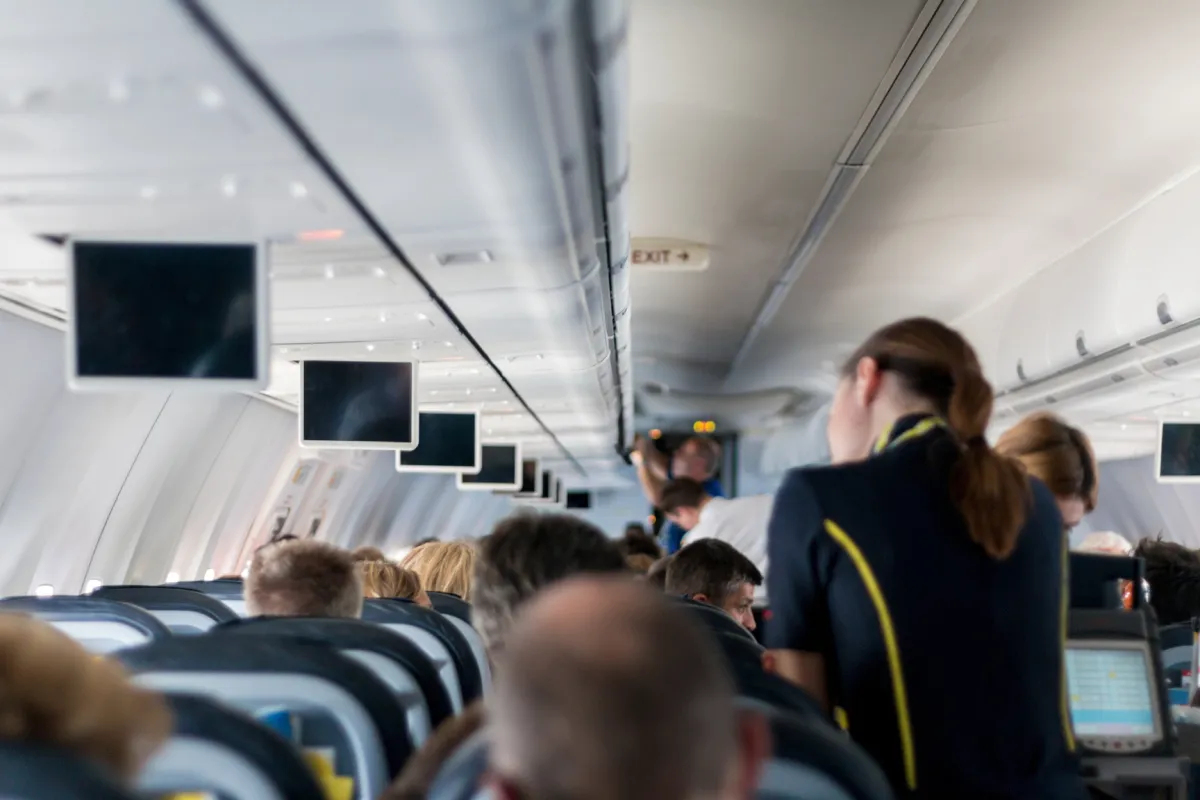
To start you off, here are a few jobs that require travel:
- Travel nurse: Nurses are in high demand across the world, especially in third-world countries. Being a nurse will give you the opportunity to travel to different places and see different cultures. Not only will you get to travel; you’ll be making an impact in other countries and communities as well.
- Flight attendant: The good thing about being a flight attendant is that you don’t need a degree. You just need to be good at communicating and customer service. If you choose this path, you eventually get to travel the world for free. (And often get discounted airline tickets as an added travel perk!)
- B2B sales representative: Do you have any experience in sales? Polish your sales skills and apply for a job as a sales representative. Just make sure to look at a position that sells products to other businesses and mostly does exporting or importing. That way you get to travel to many different countries for free.
- Travel writer: If your passion is writing, chances are you could become an excellent travel writer! Many news and media companies have these positions. Your job would be to travel to various countries, eat in restaurants, and visit beautiful destinations. What’s even better: You get paid for doing that!
- Cruise line employee: Do you get seasick? If yes, skip this one. But for those who don’t, this could be the perfect opportunity to travel and get paid for it. In addition to traveling the world, these jobs pay extremely well!
Read Next: 80 Packing Tips For International Travel
How Often Can You Travel With a Green Card?
If you’re a green card holder, traveling less than ninety days per year should be fine. Technically, there’s no limit to the number of times that you can travel per year. The only caveat being that you shouldn’t be away for more than six months at a time. Otherwise, the GCB may come to the conclusion that you’ve abandoned your US residency. This would result in your green card being revoked and your deportation.
Although many shorter flights are acceptable, this may raise questions upon returning to the USA. If you have a valid reason, that’s ok. But all in all, you should try to limit the number of times you are leaving and returning to the USA.
You Might Also Enjoy
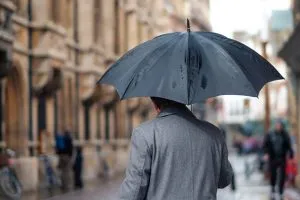
One response to “How Often Should You Travel?”
Oscar, what a breathtaking read! Your blend of personal experience and professional guidance really resonated with me. Remember when iPhones first started using Li-ion batterie? What’s the most notable change you’ve seen since then? I’ve personally found it incredible seeing my device maintain power longevity despite daily use. It’s strange though, why do some batteries perform better in cold weather? 😕
One aspect readers might appreciate is discussing ways to preserve the life of our Li-ion batteries. Also, any thoughts on potential breakthroughs in PV cells?
Stay charged, my friend. ⚡ Looking forward to your geeky insights!
Leave a Reply Cancel reply
Your email address will not be published. Required fields are marked *
Save my name, email, and website in this browser for the next time I comment.
Featured in

GET CONNECTED
Follow Clever Journey on social media for travel tips, packing hacks, and latest updates!
SUB TO NEWSLETTER
Subscribe to our newsletter to get the latest travel tips, packing hacks, gear reviews, and bargain deals straight to your inbox. We hate spam, so we’ll send only the most important stuff.
Numbers, Facts and Trends Shaping Your World
Read our research on:
Full Topic List
Regions & Countries
- Publications
- Our Methods
- Short Reads
- Tools & Resources
Read Our Research On:
Most Americans have traveled abroad, although differences among demographic groups are large
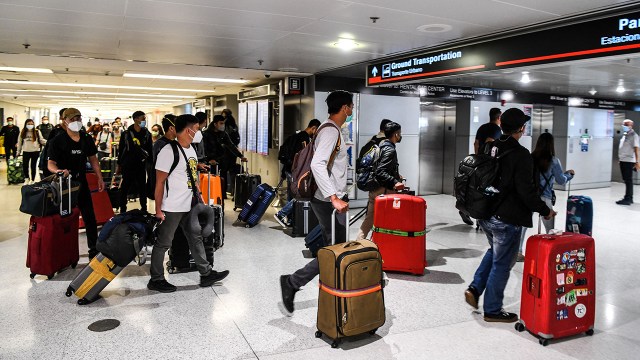
Americans are gradually returning to international travel, though international travel restrictions remain in place in many countries.
In March 2021 – the most recent month for which data is available – around 3 million American citizens traveled outside of the country. This is shy of the nearly 4 million U.S. citizens who traveled abroad in March 2020 as the coronavirus pandemic unfolded and far below the roughly 8 million who did so in March 2019, according to U.S. Department of Commerce data . But it represents a significant uptick over the low point in the late spring of 2020, when only around 1 million Americans or fewer left the United States. Still, international travel by Americans remains far below pre-pandemic levels.
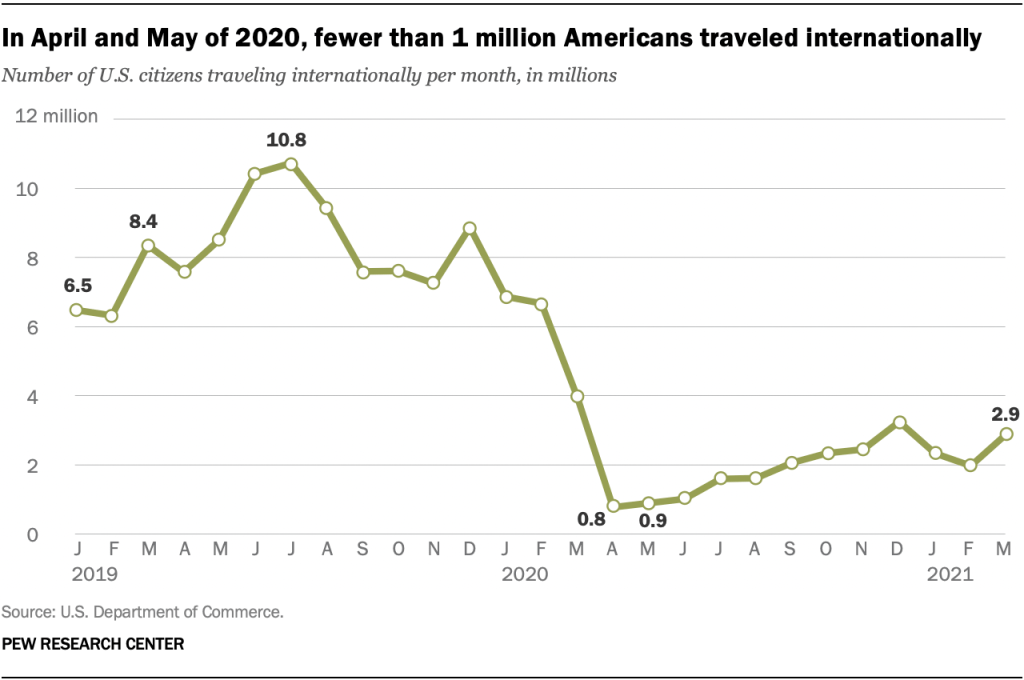
To provide context for the impact of the COVID-19 pandemic on international travel, this post looks at the habits of Americans when it comes to who most frequently goes abroad, as well as those groups in the U.S. who have been less likely to do so. To do this, we analyzed I-92 data from the International Air Travel Statistics Program at the U.S. Department of Commerce. This data includes all flights in and out of the U.S. and reports the total volume of air traffic as well as the number of U.S. citizens traveling.
The post also uses findings from a Pew Research Center survey conducted June 14-27, 2021. The survey sampled 10,606 adults who are part of the Center’s American Trends Panel (ATP), an online survey panel that is recruited through national, random sampling of residential addresses. This way nearly all U.S. adults have a chance of selection. The survey is weighted to be representative of the U.S. adult population by gender, race, ethnicity, partisan affiliation, education and other categories. Read more about the ATP’s methodology .
Here are the questions used for the report, along with responses, and its methodology .
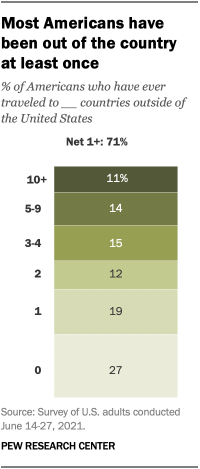
Whether before or during the pandemic, international travel is something a 71% majority of U.S. adults have done at some point in their lives, according to a June Pew Research Center survey. By contrast, around a quarter (27%) have not traveled abroad.
Still, the degree to which Americans have traveled around the globe varies widely: 19% have been to only one foreign country, 12% to two countries, 15% to three or four countries, and 14% to five to nine countries. Only 11% of Americans have been to 10 or more countries.
Who travels – and how much – also differs substantially across demographic groups. Income plays a decided role: Almost half (48%) of those earning less than $30,000 a year have not left the country, compared with 28% of those who earn between $30,000 and $79,999 a year and 10% of those earning $80,000 or more. These highest earners are also significantly more likely to have visited multiple countries.
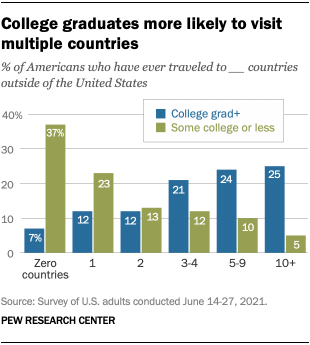
Americans with lower levels of education are much less likely to have traveled widely than those with more schooling. For example, 37% of those with just some college education or less have not left the country, compared with only 7% of those who have graduated college. College graduates are also more likely to have been to multiple countries: A quarter have been to 10 or more countries.
Women (32%) are more likely than men (22%) to have never traveled outside the country. Men, for their part, are much more likely than women to have been to five or more countries (30% vs. 22%). Still, men and women are equally likely to have been to only one country.
Black Americans are much less likely to have ever traveled abroad (49%) than White (75%) or Hispanic Americans (73%). White adults are also more likely to have been to five or more countries (30%) than Black (13%) or Hispanic (15%) adults.
When it comes to party affiliation, there are no significant differences in the share of Republicans and Democrats who have traveled internationally or in the number of countries they have visited.
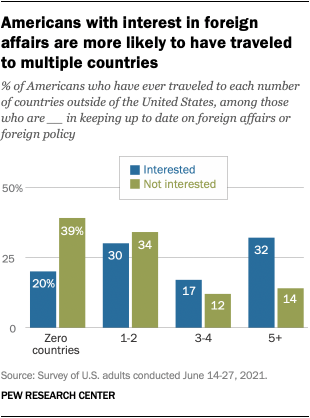
The 64% of Americans who say they are at least somewhat interested in keeping up to date on foreign affairs or foreign policy are much more likely to have traveled abroad at some point in their lives than those who say they have limited or no interest. They are also more likely to have been to many countries. For example, 32% of those who are interested in foreign affairs or foreign policy have been to at least five foreign countries, compared with 14% who are less focused on keeping up to date on foreign affairs.
Note: Here are the questions used for the report, along with responses, and its methodology .
- COVID-19 & the Economy
- Global Image of Countries

Laura Silver is an associate director focusing on global attitudes at Pew Research Center .
Wealth Surged in the Pandemic, but Debt Endures for Poorer Black and Hispanic Families
Key facts about the wealth of immigrant households during the covid-19 pandemic, 10 facts about u.s. renters during the pandemic, after dropping in 2020, teen summer employment may be poised to continue its slow comeback, in the u.s. and around the world, inflation is high and getting higher, most popular.
1615 L St. NW, Suite 800 Washington, DC 20036 USA (+1) 202-419-4300 | Main (+1) 202-857-8562 | Fax (+1) 202-419-4372 | Media Inquiries
Research Topics
- Email Newsletters
ABOUT PEW RESEARCH CENTER Pew Research Center is a nonpartisan fact tank that informs the public about the issues, attitudes and trends shaping the world. It conducts public opinion polling, demographic research, media content analysis and other empirical social science research. Pew Research Center does not take policy positions. It is a subsidiary of The Pew Charitable Trusts .
Copyright 2024 Pew Research Center

IELTS Speaking Part 1 – Topic : Places & Travelling
Free ielts correction service.

Topic : Places & Travelling
- Do you like travelling?
- What place do you most like to visit?
- How often do you visit this place?
- Why do you like it so much?
- Is it popular with many other people?
- Has it changed very much since you first went there? In what way?
- How do you usually travel to work or college? Why?
- Have you always travelled to work/college in the same way? Why? Why not?
- What do you like about travelling to work/college this way?
- What changes would improve the way you travel to work/college? Why?
- What are some benefits of travelling? Why?
- How often do you travel?
- Where have you travelled too lately?
- What kind of places do you like to visit?
- What is the first thing you will do when you arrive at the new place?
- Do you like to travel alone or with your friends?
- Why do so many people like travelling nowadays?
- How can you make sure you get the most from your travels?
Question and Answers :
Yes, I like travelling very much. In fact, travelling is my hobby and I also prefer travelling by all modes of vehicles. I love to explore new places and travelling let me broaden my horizon of experience and learning new things.
I like visiting wide open places filled with trees and sands, and accordingly, the sea beaches are the best places that attract me. Besides, places with natural beauty are always on my priority list. My second preference is the places with historical significance.
Umm…. Usually, I try to visit the place twice in a year. But if I cannot always manage time, I try paying the visit at least once a year.
I like it because I love nature. Observing the natural scenes from a hill, hearing the sea waves, gazing at trees, enjoying the moonlit night on the wide sea beaches etc. are the most favourite activities of mine. They are a kind of addiction for me. Besides this, the historical places are great to visit in terms of witnessing the past history and learning new things.
Well, I don’t think that this popular among many people. In fact, the number of people who want to go close to the nature is very limited. Though many people visit the beach, I think few of them enjoy the scenic beauties.
Yes, the place has changed greatly since my first visit. Earlier, the beach was less crowded as it was located in a corner but with the modernization, the number of tourists has increased and thus it remains crowded always even at the night time. Apart from that, the transportation facility has improved and the number of resorts and tourists’ activities has also increased significantly.
I usually ride on buses on the way to work. The bus is one of the most convenient transport modes in India and economic as well. Moreover, riding a bus takes less time to reach the destination.
No, a few years back I owned a private motorbike and used the bike all the time to reach my office. Nowadays my choice of transportation to reach office actually depends on my mood and urgency to work. On regular working days, if there are no unusual workloads, I ride a bus. But if it is a hefty working day and I need to reach office before the usual hour, I ride the bike to save time.
The bus is economical and maintains a schedule. Being on a bus gives me time to read, listen to music and enjoy the side views. These are the great things I enjoy about riding a bus.
When I am on my motorbike, I can reach office early and do not need to wait for the buses in the waiting line. Moreover, I can reach using several routes whereas a bus cannot avoid its preset directions.
I think the number of buses should be increased and the traffic system should be made more efficient with the use of technology. In some of the streets and intersection, the traffic police members control the traffic manually and it should be developed or replaced with electronic systems like the western countries. This would be a great way to reduce the traffic jam and would make the journey more enjoyable.
There are a large number of benefits of travelling including it widen your knowledge and helps to get familiar with the unknown. Travelling makes your knowledge practical and you can compare the bookish knowledge and the real-life issues. The experience we get from travelling is helpful in our life and this is an excellent way of learning about diverse cultures, people and their customs. Finally, travelling also helps reduce our stress and refresh us.
Travelling is a part of my life and I frequently travel from place to place. But some of the travels are of short distance while some others are long. Usually, I go for a long trip several times in a year.
I have travelled to Agra to visit the Taj Mahal, recently. I had not been there earlier as that is located far away from my place. This was an excellent experience and I am happy that I travelled there.
Places with natural charm and scenic beauty are on my preference list. Sometimes I like to visit places surrounded by hills, river or filled with natural beauties. Usually, the natural beauties are eye soothing and wear a great look at night times. Historical places are in the second preference for visiting.
It’s an important question. At first, I will check in a comfortable hotel or motel and then collect a local map and get familiar with the local street networks so that I don’t get lost in the area when I’m out.
I like travelling with friends. Travelling with friends is advantageous and the fun and excitements are acuter than travelling alone.
Due to the mechanised nature of the living styles, people easily get bored. The seek ways to get relief and travelling is one of the best ways for relaxation. Apart from that digital media let people know about the places they should visit. Finally, the cheap and easy air flights attract more people to visit new places.
When I go for a travel, I try visiting all the available places on the spot. I like to eat the traditional foods from the adjacent eateries, get some local collectables or souvenirs, take snaps of notable places and relics, and participate in special activities. Thus I make sure that I get the most from the travel.
Audio Part 1:
Audio part 2:.
- Describe an old friend you got in contact with again | IELTS Cue Card 2020 | Labotrees |
- Describe a line that you remember from a poem or song | IELTS Cue Card | Labotrees |
- Describe an event you attended in which you didn’t like the music played | IELTS Cue Card 2020 |
- Describe your first day at school | Speaking Cue Card
- Describe a course that you want to learn / study you would like to do in future
- Describe a story or a novel that was particularly interesting to you | IELTS Cue Card
You may also like
Describe a place you visited where the air..., describe an activity that made you feel tired, describe a drawing/painting that you like, describe an actor or actress whom you admire., describe your experience when you changed your school/college, describe a new store/shop that has recently opened..., describe the game you enjoyed playing when you..., describe a beautiful city, describe a park or a garden in your..., describe a difficult task that you completed at....
IELTS Speaking Part 1 – Topic :Tradition & Custom
Ielts speaking part 1 – topic : clothes.

We work hard to make sure our content is delivered as quickly as possible and at a speed of lightening to your fingertips.
©2023 Labotrees , All Right Reserved – Designed and Developed by Labotrees
This website uses cookies to improve your experience. We'll assume you're ok with this, but you can opt-out if you wish. Accept Read More
Unlock Your Potential
Ielts correction service.
IELTS Quang Bình
(2024) ielts speaking part 1 topic travelling.
Table of Contents
IELTS Speaking Part 1 Topic Travelling
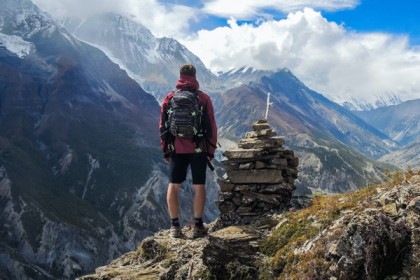
Sample Answers
1. Do you like travelling?
2. How often do you go travelling?
3. Where do you usually travel?
4. How do you feel when you are travelling?
Some IELTS Speaking part 1 topics you may like:
- (2024) IELTS Speaking Part 1 Topic Running
- (2024) IELTS Speaking Part 1 Topic Transport
- (2024) IELTS Speaking Part 1 Topic Chatting
- (2024) IELTS Speaking Part 1 Topic Map
- (2024) IELTS Speaking Part 1 Topic Clothing
- (2024) IELTS Speaking Part 1 Topic Gifts
- (2024) IELTS Speaking Part 1 Topic Study and Work – Free Lesson
- (2024) IELTS Speaking Part 1 Topic Accommodation – Free Lesson
- (2024) IELTS Speaking Part 1 Topic Hometown – Free Lesson
- (Update 2024) IELTS Speaking Part 1 Topic The area you live in Free
Image : Photo by Simon English on Unsplash
Related Posts

(2024) IELTS Speaking Part 1 Topic Visit Relatives

(Update 2024) IELTS Speaking Part 1 Topic Taking photos Free

(2024) IELTS Speaking Part 1 Topic Chocolate
About the author.
- IELTS Online Test: https://online.ieltsquangbinh.com - Website: https://www.ieltsquangbinh.com - Facebook: https://www.facebook.com/IELTSQuangBinh - Twitter: https://twitter.com/IELTSQuangBinh - Youtube: https://www.youtube.com/c/IELTSQuangBinh - Instagram: https://www.instagram.com/ieltsquangbinh
Leave a Reply Cancel Reply
Save my name, email, and website in this browser for the next time I comment.
Welcome Guest!
- IELTS Listening
- IELTS Reading
- IELTS Writing
- IELTS Writing Task 1
- IELTS Writing Task 2
- IELTS Speaking
- IELTS Speaking Part 1
- IELTS Speaking Part 2
- IELTS Speaking Part 3
- IELTS Practice Tests
- IELTS Listening Practice Tests
- IELTS Reading Practice Tests
- IELTS Writing Practice Tests
- IELTS Speaking Practice Tests
- All Courses
- IELTS Online Classes
- OET Online Classes
- PTE Online Classes
- CELPIP Online Classes
- Free Live Classes
- Australia PR
- Germany Job Seeker Visa
- Austria Job Seeker Visa
- Sweden Job Seeker Visa
- Study Abroad
- Student Testimonials
- Our Trainers
- IELTS Webinar
- Immigration Webinar
Travelling, Tourism, Holidays IELTS Speaking Test with Answers
42 min read
Updated On Nov 22, 2023

Share on Whatsapp
Share on Email
Share on Linkedin

Get a Complimentary IELTS Speaking Strategies PDF
This article contains the Travelling, Tourism, and Holidays Speaking sample answers.
IELTS Speaking consists of a short discussion between the examiner and the candidate. You will be asked a series of questions on common topics. You have to state your opinion or experiences.
Given below are the actual IELTS Speaking Part 1 stuff based on Travel questions and answers, followed by Speaking Part 2 and 3 on the same topic. When speaking, your tone will clarify and convey meaning.
Aiming for a high Speaking score? Take a look at the expert tips and tricks below!
Speaking Part 1
1 do you like travelling.
Yes. Travelling just changes your mind and refreshes you and makes you forget the busy work schedule. When you start enjoying yourself for some time, you get charged up.
2 Whom do you often spend the holiday with?
I often spend my holidays with my cousins at my grandma’s place in Hyderabad which is the capital of Telangana state. We enjoy each other’s company.
3 Have you done much travelling?
Yes. I have. Places which I visited have a very rich heritage and are colourful like Jaipur which is also known as the pink city, Hyderabad which is also a great metropolitan city, Nagpur famous for its oranges, Delhi famous for its shopping centres and food, Punjab famous for its lively atmosphere and etc.
4 What kind of places have you visited in your life?
I have visited almost every type of place where people enjoy their life, places where people have a lot of opportunities to express their creativity, places which are well known for their educational facilities etc.
5 When you visit new places, what do you like to do?
Whenever I visit a place the first thing I do is search about the history or past of that place ,then record the experiences I get there. I write about what I did , what I liked etc. I just jot down in my travel diary so that whenever I open and read it I can relive those memories.
6 Do you prefer travelling alone or in a group?
I prefer travelling in a group as it’s always safe and most affordable. Also when we go on a trip as a group we are bonded with different type of people and make a lot beautiful ,sour and sweet memories.
7 Do you often travel abroad?
I haven’t travelled abroad yet. First I want to tour all places within my country.
8 In which seasons do you prefer to travel?
I prefer travelling in winter because the weather and atmosphere remains cool and soothing and it feels good to travel when it’s cool and soul-satisfying.
9 What is the best season to travel in your country?
The best time to travel in India is in the span of November to February when it is mixed weather. In this period it’s cold and dry simultaneously.
10 Would you say your country is a good place for travellers to visit?
Yes , definitely. India is considered to be one of the best countries to travel to because of its rich and diverse culture. The way the people in India welcome others with such a warm heart is tremendous to be felt.
11 What would you recommend a foreigner to visit in your country?
Each and every place in my country is significant for a particular thing. I would rather suggest a foreigner to tour all over India because there is not even a corner here that isn’t unique.
12 What places would you like to visit in the future?
I would like to visit New York and also Switzerland. These are my most favourite and desired destinations because of their scenic beauty and also the people who are very generous and sweet.
13 How much time do you spend travelling on a normal day?
On normal days I don’t spend much time as you know I’m pursuing my studies and working simultaneously. So it is really difficult to travel on normal days.
14 What do you do while you are travelling?
When travelling in a car I just sit back and enjoy the scenery. When on the train I really prefer sleeping and if I’m travelling by flight I would prefer reading a novel with my music on.
15 Do you think your hometown is a good place for a holiday?
Yes , definitely. My hometown is the best place to visit on a holiday as it has the best scenic views and a lot of places to roam around. Also my hometown is kind of famous for its delicious food and shopping areas.
16 Are you planning any vacations at the moment?
Yes, I am actually planning a vacation at the moment. I’ve been considering taking a trip to South Korea, which is known for its unique food and beautiful landscapes. I believe it would be a great opportunity to unwind, explore a new culture, and take a break from my daily routine.
17 Can you easily find your way around new places?
I would say that I’m quite adept at finding my way around new places. I enjoy exploring unfamiliar destinations, and I usually start by researching the area before I arrive. I rely on maps and navigation apps on my phone, which are incredibly helpful. Additionally, I often ask for directions from locals, which not only helps me find my way but also allows me to interact with people and learn about the local culture.
18 Can you tell me about the kind of things that you usually do on holiday?
I spend most of my time with my family members because my holidays are the only time I am available to them. I also pay visits to my extended family members. We as a family love to talk a lot, play games, watch films and go shopping.

Speaking Part 2
Describe a tourist attraction you once visited.
You should say
- When you visited it
- Where is it situated
- Whom you went with
- and say what about it you like the most
Sample Answer 1
I love to visit places, but due to my busy schedule, I am unable to go out on a lot of trips on holidays. Before the global pandemic started, I visited Sikkim with my family. I don’t clearly remember the exact date ,but it was in the month of May, 2019. It was summer, but the weather was very soothing there. Sikkim is one of the smallest states of India situated in the North eastern part. Since my childhood I was drawn towards mountains more than I was towards the sea. Mountains always used to be peaceful and calm and I think that is the most attractive part of it. We started our journey from Pelling which is a small town in the northeastern Indian state of Sikkim, at the foothills of Mount Khangchendzonga. The town is filled with monasteries and waterfalls. Pemayangtse Monastery is another equally important Buddhist shrine in Pelling. I visited the place the same day I visited Khecheopalri Lake,Rimbi fall, Kanchenjunga falls and Singshore bridge. It is the second largest suspension bridge in Asia. The next day we visited Rabdentse Ruins and in the evening we were off to Ravangla. Unfortunately it started to rain so we were unable to visit anything but Temi tea garden on our way to ravangla. The next day we were off to Gangtok. We stayed there and went out on alternative days for sightseeing. We visited Tsomgo lake, Seven Sisters waterfall, Banjhakri falls, Rumtek monastery. The days we were not sightseeing, we used to spend quality time in the Gangtok “mail” which they used to call their shopping markets. We were unable to visit Nathula Pass as it started to snow heavily. We visited Yumthang-the valley of flowers and the flower shows of Gangtok. The beautiful snow capped mountains, the waterfalls, the monasteries, the lakes, the people and everything was so serene and beautiful. Sikkim increased my love for mountains ever since. I had a memorable trip which I will relive forever.
Vocabulary for Cue card
- Suspension: hanging Eg: The suspension bridge is beautiful
- Sightseeing: visit places of that area Eg: She was going sightseeing before she left.
- Relive: to live again Eg: She was reliving her old memories.
- Monasteries: Buddhist Pilgrimage Eg: The north east is full of monasteries.
Sample Answer 2
The Colosseum, one of the few intact Roman Empire constructions, stands today as a testament to ancient Rome’s architectural and engineering prowess. It is also a significant source of tourism.
I visited it with my family during a trip to Italy. I have always been very interested in the history of Rome, so I was excited about this visit. The Colosseum is a Roman amphitheatre open to the general public. It was built solely for the amusement of the Romans, and there were numerous games held there during the week in ancient times. It was famed for hosting exotic animals, chariot races and gladiatorial combat. We did the underground tour of the Colosseum. Our guide told us how the lower levels would be flooded with water to simulate naval battles during the shows. She also gave us great detail in terms of the architectural structure and cultural importance of the site. I learned a lot and was amazed by the sheer scale of witnessing it in real life as opposed to photos. I would definitely recommend checking it out if you have the opportunity.
Describe a beautiful place you once visited
- when you went to this place
- where it was
- whom you went with
- and say why you liked it so much.
Sample Answer
I happened to have a trip to Darjeeling a few years back. I don’t exactly remember the perfect date, but it was soon after my class 10 board examination. It was a trip conducted by my school authorities which can be classified as an excursion. Darjeeling is one of the prettiest hill stations in India located in the northern part of West Bengal. It’s all about magnificent views of snow capped Kanchenjunga, streams flowing down the mountain slopes, lovely tea gardens, landscapes with firs, pines & ferns, and all that combined with friendly people and modern yet colonial charm. We took a train from kolkata to NJP station. From there we took a bus that was pre-booked by our tour guide manager. There were fifty students and 8 teachers,along with our tour guides. We were served our lunch packets on the bus. We visited the beautiful himalayan railways aka toy trains. It was so beautiful to get a city ride on a toy train by the side of the mountains, stopping at every beautiful spot. The majestic view of the mountain on one side and the busy lives of people in the city was something worthy of watching. We also visited Batasia loop, Tiger Hill,ropeway,Himalayan Mountaineering Institute , the zoo,Rock Garden and several other places. We stayed there for about a week. On the evening of the fifth day, we were given permission to buy things from the shopping area of Darjeeling. As it was an excursion, it’s needless to say about the amount of fun I had there with my friends. On the sixth day we were off to the NJP station recalling the very new memories and sadness of the ending of our much-awaited trip. We bid our goodbyes to the most beautiful place of our dream, but the art of heaven, named as Darjeeling, will remain cherishable in our heart and brain forever.
- Majestic: having or showing impressive beauty or scale. Eg: The sight was majestic in its own way
- Excursion: a long trip held by the institution Eg: our school held an excursion to hyderabad.
- Relive: to live again Eg: She was reliving her moments with her grandmother.
- Art of heaven: very beautiful Eg: The sketches she makes are like art of heaven
Describe a short trip that you usually make (or, take) but dislike
- where you travel from and to
- how often you make this trip
- why you make this trip
- and explain why you dislike this trip
Since I study in Bhubaneswar and stay in Kolkata, the trip from home to college is often the trip I dislike to make. The journey from Kolkata to Kalinga is the most disliked journey I have to take every now and then.
I return to Kolkata whenever I get a long holiday in my college and whenever I want to spend some quality time with my family.
Being born and brought up in a bengali family, you are bound to be home-sick. And I’m no exception. Just everytime I get a chance, I pack up and return home. So, I have to make the trip back to Bhubaneswar when the holidays are over.
Whenever I return home, my mother pampers me so much that I always feel reluctant to return to the college hostel and live on my own. Though good food is available in the hostel, it is no match to the home-cooked food. So, whenever It’s time to return to the hostel, the thought of doing everything on my own is the very reason why I dislike travelling. But there’s one more reason too. I have to travel alone most of the time and since this is long, I often get bored by the monotonous journey. I usually travel in 3 tier AC, and the people travelling are on a trip to Puri with their family, which makes me want to return. They are all to themselves, and being a grown up it seems awkward to reach out and start a conversation. Thus the dislike becomes stronger each time.
- home-sick: loving to stay at home. Eg: She was home-sick.
- homeland: a place where u grew up Eg: Nadia is my homeland .
- Pamper: give special care Eg: She often pampers her sisters.
Describe a trip that took longer than you expected.
- when it happened
- where you were travelling to
- whom you were travelling with
- and explain why it took longer than you expected.
A few years ago, we were on a road trip to Digha. It was my elder sister’s Bachelorette party. There were ten of us, out of which five were her friends, and 5 were cousins. We booked a ten-seater van to travel. It was air-conditioned. If I can recall, it was in 2018.
The first few days flew swiftly. Then, the west winds started. Bengalis call it Kalboishakhi. Storm, rain, and sea never go well together. Beaches were a prohibited place, and we were instructed not to leave the hotel. Thus, we were stuck inside the hotel room and were all to ourselves. The return trip was canceled, and our journey got delayed. But it was the best time of the year. We had parties and were gossiping, recollecting memories, and even were on movie marathons.
We were supposed to return after a week. But we returned after 15 days. Even though the situation was challenging, we were having a good time. The weather was scary near the sea. No tourists were out. But I loved the journey even though it got longer than expected.
So when we returned, we had a lot to plan and organise for my sister’s wedding. But keeping in mind the storm and the sea, we were buckled up for whatever work stress that was about to hit.
- Bachelorette: a celebration one gets before they get married Eg: She went to a Bachelorette party with her brother.
- Kalboishakhi: the Western storm from Bay of Bengal that hits West Bengal during Summer Eg: There’s a possibility of kalboishakhi in the next week
- Buckled up: gather up what you dropped; gather courage Eg: She buckled her up for the upcoming competition
- Delay: got late Eg: The train got delayed because of the rain.
- Movie marathon: watching a series of movie in a single sitting Eg: The friends were having a movie marathon .
Describe a trip that didn’t go as you had planned/expected
- where were you travelling to
- who was travelling with you
- what didn’t happen according to plan
- what did you do there
- and explain how you felt.
Last year we were on a trip to Puri.
It was a trip with my family members. We hadn’t been anywhere for a long time, so we decided on taking a short trip to freshen our moods. My father always has this habit to pre-plan all the places according to the days.
One day, we went sightseeing in Chilka and several other places nearby. It was a long day planned till evening. It was all according to plan until my father decided to take the advice of our driver. He was a localite and knew every road and turn. He was well accustomed to the history of the temples and the places. He suggested we visit a few temples that were really beautiful. He also added that the history of those places was very intriguing.
We returned 3 hours later than we had planned but the journey there was worth the time, we lost. We visited 3 temples, and the driver took us to a small village near Kalinga. We saw handloom works and several other things that will forever stay in our memories.
It was an unnoticed, not so famous village. The people were so humble. We wouldn’t have visited the place if he hadn’t suggested it to us. I had fun, and so did my parents. If I visit Puri next time, I will revisit the place.
- Sightseeing : places inside an area to visit Eg: She went sightseeing .
- Humble: good and polite Eg: She was a humble girl
- Localite : local area person Eg: He was a localite.
- Intriguing: arouse the interest, desire, or curiosity Eg: The friends were having an intriguing conversation.
A bicycle, motorbike or car trip you would like to go on in the future
- Where would you like to go
- How would you like to go there
- Whom would you like to go with
- And explain why you would like to go there by car, motorbike or bike
The thing that troubles me more often than not when living in the city is that majority of people are riding motorbikes rather than cars. As a result, most people don’t know how to drive a car, including me, which also annoys me, since I have always wanted to take a road trip across the country. A road trip by car from the south to the north of my country would be tough and adventurous because hundreds of marvelous destinations are waiting to be explored. However, it is worth taking risks and stepping out of your comfort zone to truly experience what life has to offer when your legs can still carry you rather than to regret later in your life.
“If you wanna go fast, go alone. If you wanna go far, go together.” It might be fun if you were a lone traveller and didn’t enjoy getting lagged behind your schedule. But, the adventure could be more colourful and unexpected, when you’ve got company, especially during a long journey like the one I prefer. Hence, my choice would be to pick up a close friend or two who share the same vision, the same eagerness to capture the beauty of nature. We would start from the south where we are living and move north. On the go, we could stop by our favorite beaches a little longer than other places because there isn’t anybody who doesn’t have time for juicy coconuts and white sand paradise. Traditional cuisine would also be our utmost priority whenever we reach a new place as the best way to live like a local is to eat like a local. A car is our best choice because it would give us room to comfortably converse with each other and shelter from inclement weather during our journey if any. It is not only about the destinations but also about the time I would love to spend with my dear friends as we would share the same space in a four-wheel vehicle along the road; and at the end of the day , it’s the people that matter.
- more often than not: usually Eg: More often than not, people get confused with this map.
- take risks: to do something that might be dangerous Eg: You have to take risks to win .
- have to offer: have something available to be used or appreciated Eg: She has to offer prayers to God .
- get lagged behind: get fallen behind Eg: The yellow car got lagged behind.
- cuisine: style of cooking Eg: She likes Chinese cuisine.
- utmost: greatest; most extreme Eg: Knowledge is of utmost importance .
- inclement: not pleasant; cold, wet, etc. Eg: The inclement weather is not safe for flights.
- at the end of the day: in the end, finally Eg: At the end of the day your hard work pays off.
- shelter: protect or shield from something harmful, especially bad weather Eg: The birds are in search of a shelter.
Also check :
- IELTS Speaking tips
- Linking words for IELTS Speaking
- IELTS Speaking recent actual test
- Sports Vocabulary for Cue Card IELTS
- Work Vocabulary for Cue Card IELTS
- IELTS Speaking Part 3 Topics
- Idioms for IELTS Speaking
- IELTS Pronunciation Guide
- Common English words in IELTS Speaking
Describe an unforgettable trip you have had
- When and where you went
- Who you went with
- What you did there
- And explain why you think it was enjoyable
Well, it has been two years since I had my very first motorbike trip with my colleagues to one of the most ancient villages situated in the Northwestern part of our country. And I have to say that it was the most memorable trip that I’ve ever had.
Our group with 3 people made a decision to visit a village because we wanted to get away from the hustle and bustle of the city and get off the beaten track. Moreover , the village was fairly typical of the countryside in our country, so we wanted to get an insight into the lifestyle of local people there.
We set out for a day trip quite early. I’m always a night owl , not an early bird , so leaving the city at 5 a.m made me feel like I was deprived of sleep. However, I was over the moon shortly after embarking on the trip to the village. This was because on the way to get there, we had a chance to get the magnificent views of breathtaking landscapes which is totally different from the city we are currently living in. After a long drive, we got to the picturesque village which made me feel deliriously happy. We rented some bikes to cycle around the village to feel the vibes of the village. After that, we visited some 400-year-old ancient house and had a look at communal houses where the local people gathered for festival celebrations or public meetings. Then we had lunch and the food was scrumptious . In the afternoon, we joined a cooking class with the villagers who were extremely friendly and clever at making traditional cakes. The highlight of the trip to the village was going to the paddy fields to help the farmers harvest the crop. It was once-in-a-lifetime experience which we really enjoyed. My friend was like a dog with two tails while I was also on cloud nine . We relished everything in the village from the fresh air, cozy ambience to beautiful landscapes such as small houses or paddy fields. We hoped that we can have a longer trip to the countryside down the road if we had more spare time.
- made a decision: Making an agreement to something Eg: She made a decision.
- get away from the hustle and bustle of the city: go to somewhere peaceful Eg: She wants to get away from the hustle and bustle of the city
- get off the beaten track: get distracted Eg: She got off the beaten track
- fairly typical of: things of the same type Eg: It’s fairly typical of her.
- get an insight into: to gain some knowledge about Eg: She got an insight into the matter
- set out: begin a journey Eg: She sets out for the journey
- night owl: stays up all night Eg: She is a night owl
- early bird: wakes up early Eg: He is an early bird
- deprived of: devoid of Eg: She is deprived of medicines.
- over the moon: very happy and delighted Eg: She is over the moon for her success
- embarking on: to begin a journey Eg: She embarked on a journey to Delhi.
- the magnificent views of breathtaking landscapes: very beautiful sight Eg: She is awestruck by the magnificent views of breathtaking landscapes.
- picturesque village: Beautiful village Eg: It’s an picturesque village
- deliriously happy: very happy Eg: She is deliriously happy.
- feel the vibes: sensing the energy Eg: I can feel the vibes of winning.
- Scrumptious: delicious Eg: The meal was scrumptious.
- Once-in-a-lifetime: happening once in your entire lifetime Eg: One should visit NYC at least once-in-a-lifetime.
- like a dog with two tails: used to emphasize how delighted someone is. Eg: She is so happy that she is like a dog with two tails
- on cloud nine: very happy Eg: She is on cloud nine today.
- Ambience: Surrounding and atmosphere Eg: The ambience is very appealing.
- down the road: down the memory lane Eg: She went down the road and realised how innocent she had been.
Excited to Know More About Speaking Part 2? Get in Touch With an IELTS Expert Today!
Book a FREE Demo!
Speaking Part 3
1 do people in your country like to travel.
Yes, people in India like to travel. India is a colossal country to travel around. There are so many beautiful and adventurous places here. Hence people of India are athirst to travel from one place to another. Indians are always keen on discovering the daring and quixotic moments through travel. Nowadays, Indians mostly travel with friends wherever they get a vacation or a weekend
2 How has travelling changed, compared to several decades ago?
With the growing population and economic growth, India has changed especially in regards to travel. People now travel for uploading travel blogs, pictures or everyday travel videos on social media.The mode of transportation has improved a lot, as travel now is cheaper, comfortable and faster. Nowadays content creators go to places, find stuff and share in social media which is phenomenal. Now travel has become so easy that anyone can go for a long vacation.
3 When do people travel (as tourists), whom do they usually go with?
People usually travel with family friends or loved ones for a weekend to a neighbouring country or for a family vacation or for long travel. There is something within us that triggers us to pack our bags and visit a new place. Tourists mainly visit India, especially the southern part of India, during April – May and December for experiencing the crystal blue waters and soft white sand beaches. Tourists usually visit India with family and friends. Some people come with their loved ones to spend their most adventurous moments of life.
4 Do you think travel can (or, does) change people’s ways of thinking?
I think travel has made people better communicators. It has allowed people to be more patient. Through travelling, people can get to know a lot more about the world around them. Travel increases the desire to meet new people and pushes one to explore all kinds of amazing, admirable things. You become a well-rounded person just by experience. Travelling focuses on a greater sense of empathy and we also gain knowledge about diverse cultures. Interaction with people is another pathway to revitalize our minds. I think travelling really develops a personality. They become less judgemental, more stable, more open-minded, find themselves more optimistic, and don’t panic often.
5 What are the disadvantages of not travelling?
There are many disadvantages of not travelling to a new place. Many educational and health benefits will be missed. We will be unable to learn new cultures and languages. Memories for a lifetime will really pass over. You will not be able to deal with the stress, if you don’t take a break and travel. Also, you cannot sense and appreciate independence. You cannot boost confidence within yourself. You cannot realize your passion if you are not physically exploring places.
Travelling in cities
6 how do most people in your country travel to work.
Most of the people in India own a vehicle. It could either be a two-wheeler or four-wheeler. And the ones who don’t have a private vehicle travel through public transport like metro, buses, or by local trains. Sometimes they travel by subways too.
7 People in cities used to like living downtown but now they prefer to live in the suburbs. Can you explain why?
In suburbs there is a lot of free space available. Also in most suburbs, there is an element of peace and people lead a normal life. But in cities, the places have become more and more compact with population increase. One more advantage of suburbs is that the cost of living is low.
8 What is the impact of vehicles on people’s lives?
Owning a private vehicle is very common nowadays. It makes our life easy as we can travel at our convenience. People have started travelling from one city to another. Vehicles have made their life comfortable. People have also become a bit lazy as they tend to take vehicles even for shorter distances and also a lot of fuel is burnt in this process.
9 Do people in your country prefer to walk or take a car for short trips?
People in India mostly prefer taking a walk if it is a very short trip like walking to the nearby grocery shop. Walking is also essential for a person to maintain proper metabolism. Walking is preferred because firstly it is, of course, environmentally friendly and also it boosts up our immune system ,energy, and also keeps our heart healthy and fit
10 How can big cities deal with the problem of having many people crowded in the same place?
We can help people by providing them with valuable and good sources of information to plan a visit. E.g., Help schedule the time of travel. We can also improve the infrastructure in an area that can reduce overcrowding in the particular region. We can also encourage corporate companies to build technology parks in the suburbs and villages as well.
11 Are there any connections between transportation and the environment?
Yes, there is a direct linking between travelling and the environment. When the weather is perfect and soothing, we enjoy travelling. If the heat comes right above our head, we get irritated and will not enjoy our trip.
12 Does your hometown have problems connected to transportation??
The transportation in my hometown is not good. The public transport can’t be trusted because the buses don’t arrive on time. Also, the people aren’t educated and are unaware of the timings of public transport. The most important thing is that women are concerned about their safety in public transport.
13 How could these problems be solved?
These problems can be solved by making people aware of the timetable of the buses. They can also educate the drivers about being on time. The people can be trained to use metro options too
14 Is cycling very popular in your city?
Cycling is given a lot of importance in my hometown because it is good exercise. People are educated and know that it helps in increasing cardiovascular fitness, muscle flexibility, decreasing stress level and that it also makes our mind fresh and boosts up our energy level.
15 What are the differences between travelling by car and travelling by bicycle in a city?
Car is faster and effective than bicycles. A car can hold more stuff into it, but you can’t carry heavy items in a cycle. Also in a car, safety is guaranteed because of its compact and secured design. A car can house a group of people but a cycle cannot. Also it is way more comfortable than a cycle.
16 What are the advantages and disadvantages of cycling in the city?
Riding a bicycle helps in building mental and physical fitness. It helps in saving a lot of money too. It is rejuvenating to take a cool shower after cycling for an hour or two. As we have pros, there are cons too. We may be exposed to the day’s temperature, which can harm our body ( if it is not moderate). We can meet with accidents. Cycles are theft-prone too.
17 How could the government encourage more people to use bicycles in the city?
Government can create separate lanes for cycling. They can also introduce some schemes related to cycling. Marathons can be held in a regular interval of time. They can even distribute pamphlets regarding the importance of cycling to encourage people.
18 What are the benefits of having a good public transportation system in a city?
Having good transportation in a city makes life convenient and helps people reach their destination on time. It will be safe for girls to travel. Also, it helps in less consumption of fossil fuels like petrol or diesel. By this, we can help in reducing the pollution as we will use the buses rather than our own vehicle.
19 How will transportation in cities change in the future?
There are already many plans that our government is looking into, and one of them is the technology of the bullet trains, which can help people travel in less time at a very reasonable cost. In the coming days, people might develop a technology that can help them reach their destination within the city very fast and without pollution.
International travel
20 do people from your country like to travel abroad.
Yes , many of my friends travel abroad when they get holidays. Also, many such people are there who go out of India to experience more about the culture, food , people ,climate , of foreign countries.
21 Can you suggest why some people (from your country) go abroad to work?
Some people go abroad to work to get more exposure and gain experience. Some people like to travel a lot. So they take up a job which will help them in travelling. They even travel to embrace a new lifestyle and also to learn a new language.
Traffic congestion in cities
22 what causes traffic problems in big cities.
Due to the increase of population and growth of the economy in big cities, people rush for work everyday which is the main cause of traffic problems. Due to an increase in the number of vehicles on the road such as at the peak hour, lack of vehicle regulation has increased the problems. Sometimes non recurring events like road accidents slows down road traffic and weather problems also result in immobility of vehicles.
23 What could be done to solve this problem?
The more the lanes, the higher the capacity a road has. So cars should be able to drive faster, but that’s a very narrow analysis of the problem. Some technical procedure is needed to control the traffic jams over roads. The use of public transport should be encouraged. Parking should be controlled via universal pay and park-in parking facilities. Proper signboards at each and every junction may also help to reduce traffic. Traffic control systems should be improved, traffic lights should be fully computerized and constantly serviced. Traffic lanes could be created for multiple-car occupancy.
24 What do you think are the benefits of having a good public transportation system in a city?
Travelling by public transport is very useful in saving money. You don’t need to spend much money on purchasing cars. Imagine that you are on a bus, taking a seat, and starting to relax by reading the newspaper or sleeping a little while. Yes, you can do this on a bus. You don’t have to concentrate on the road. This source of transportation is perfect for tourists. It is a good alternative for the older generation. Public transportation sometimes becomes adventurous, and we get to know many new people every day.
25 How do you imagine public transport might change in the future?
I think public transport might change in the future. The world is changing fast. Cities are growing, and the urban population is rising. The need to transport people and goods is increasing, but so is congestion, air pollution, road accidents, and climate change. In the present times, electric vehicles are used for public transport, and the transportation system is enabled through an integrated cloud platform, connecting vehicles, people, infrastructure, and logistic platforms. Bus platooning is improving efficiency and capacity in the city of public transportation. The future is the electric zero mission with low noise, giving the electric combat excavator access to the environmental city zone.
Long-distance travel
26 what are some of the reasons why people travel long distances.
There are many reasons like getting more of a personal perspective, giving yourself some time, grasping more adventure. Also, the most important thing is building a solid relationship with whomever you travel.People tend to travel to meet their family members who stay at a distant place. Travel bloggers travel for fun and pleasure.
27 Is it easier to travel long distances today than in the past? (Why?)
Yes, it has become much easier to travel now than in the past. Nowadays, it is much more feasible and affordable for a person or a group of people to travel even to far off places. In fact, nowadays people just travel because they are crazy to explore the latest technology
28 How does long-distance travel today differ from the past?
Nowadays it’s very convenient and affordable and also we have a lot of options as in to travel anywhere but this wasn’t the case in the old days . People used to travel mostly with bullock carts or either used to take walk for travelling which would take a lot of time but with the help of recent technology we can travel faster
29 What effects does long-distance travel have on people?
People who are old or babies usually get tired in the long-distance journey. If we are with a group of people and travelling, it becomes fun, but if we had to travel alone, we tend to get bored. And also most importantly, it can turn into travel fatigue which disturbs our daily lives.
30 Can long-distance travel ever create problems for people?
People who travel frequently tend to become lonely and may develop long-term health issues that can be very dangerous at times. Travelling long distances isn’t cheap either. Also it is very taxing. Even after reaching our destination we become lethargic and tend to sleep more rather than taking a tour of the place.
31 Does long-distance travel have any effect on the environment?
Travelling long distances by any means of transport will cost you a lot and is also not environmentally friendly. All types of transportation including air create a greenhouse effect in the topmost layer, which is way too hazardous.The most polluting vehicle is the flight. Then comes the car and train. Cars use fossil fuel and release toxic gases into the air.
32 How might long-distance travel change in the future?
With the advent of technology, it might become much easier and affordable to travel. We can reach long distances at the fullest comfort in no time. Recent research shows that electric flights might be coming up in the future to minimise pollution.
33 How would it be like to travel to space?
It would be fantastic. There are very few people who have been getting a chance to undertake such excellent travel. And if I am the chosen one I might be very proud of myself to step into the moon.
34 What are the problems people might experience when going on a trip and what could be done to avoid/solve these problems?
There are a lot of problems which might occur during travel. We might suffer from health issues or run out of cash, or get delayed, which might affect our whole tour. The only solution for this is that we should plan adequately before we step out.We can also pool vehicles to avoid pollution.
Preparing for a trip
35 is it important for travelers to carefully plan the trip.
Yes, planning a trip is really important for travellers. If everything happens in an organised way, we can switch to the travelling mindset with ease. Traveling to different places and staying there for a few days will help us to rejuvenate and relax if we arrange everything before the trip.
36 What are the differences between a well-planned trip and a trip that is not well-planned?
Well-planned trips are those which accommodate even the sudden changes that occur on the spot. Talk and discuss the trip with whom you are going. Make sure you have the travel plans. Let the problems be sided and let all the solutions get strained in one piece of sheet. Not planned trips will face budget problems and they will meet with unnecessary expenditures. They will not know more about where to visit how to go, and how to stay. They will not be aware of the culture and of the place they are travelling to and will always face problems.
37 In general, what factors should people consider when planning a trip?
We need to first focus on booking tickets or visas or passports. Internal currency planning, sightseeing, etc seem to be so daunting which is why people rely on travel agents and they don’t mind paying them. But making a plan under budget needs time. The factors that we should keep in mind while making the trip are the number of days needed to reach the destination, travel companions, and adventures.
38 What essential things do people need to take when they go on a trip?
I will now talk about some of the essential things people need to take when they go on a trip: a neck pillow for train or flight travel to relax the body. Eye masks are also crucial for good sleep, as we also need time to energize ourselves through sleep. We need to take our clothes accordingly by keeping in mind the weather of that particular place. You can take a camera with you to capture those beautiful moments, which would remain handy. Chargers and power banks are very crucial during travelling. Skincare products and other necessary makeup materials can make you look glamorous with a photoshoot.
39 Do you think there are any differences between men and women when they plan a trip?
Yes, I think there lies a difference between men and women when they plan a trip. Women start packing a month early. They make several lists, pack for themselves and their kids. They plan many activities for their kids, and they get busy with packing different varieties of clothes and makeup. Women stage things serially and in an organised way, but men remain leftover with last moment packing. Men drag 2 – 3 pairs of jeans, shirts and 3 pairs of socks and shorts, and they’re done. They remain excited and capture the beautiful natural beauty on a camera.
40 People with different personalities sometimes plan or prepare for a trip differently. Can you give some examples of this?
People with different personalities plan and prepare for trips differently as they want to explore and explore that destination from their inner core. Naturally, people travel for enjoyment with family and friends, but some people think differently. They remain enthusiastic about bringing out the dangerous unknown adventure. They generally make sudden plans.
41 How do people find information about places to travel to?
There are several factors which people must consider while preparing for a trip. They should not get so confused about stuffing all the things in one bag. Some usually keep everything for the last moment and get confused. These people must make a checklist and ensure that all the necessary documents, cards are adequately arranged. They should also double-check that necessary medicines and clothes are packed.
42 What factors would people consider when preparing for a trip?
Nowadays we can find information about travel on the internet . We can get information through vlogs, twitter, and different social media sites. We can easily get a detailed analysis and budget list of the particular destination. There are travel agencies that help us with information about unknown places . The encyclopedia and youtube travelogue channels, also make our travel easy.
Travelling differences
43 if you were travelling with friends, what qualities would you like them to have.
When we have to choose the travel companion we should think of a person who is compatible and has a good sense of humour, is sensible, generous and also shares the budget
44 Some people prefer to go on guided tours when they travel while others prefer to travel individually. Which do you think is better?
From my point of view taking up a guide is more preferable as these people have knowledge which may not be in books or any kind of brochure and they also will suggest the best and affordable places to stay, eat etc
45 What are the different means of transport that a person can choose when travelling?
There are different types of transport which one can use for travelling. For example, sea, rail, flight or car. Most suitable out of these is the flight as it makes our travel quick and convenient. Other means of travelling such as public transport or cabs etc also make life easy and enable us to enjoy a tour.
46 In what ways does a person’s wealth affect the quality of that person’s travelling experience?
Wealth does affect the quality of travel we do. If we are rich, we can enjoy a trip to the fullest. The opposite of it is that if we have less money to spend, we may have to compromise our comforts.
47 Whom do you think learns more from travelling, old people or young people?
Young people learn more. The youth get inspired by travelling as they get to know more people and learn how to handle them. They also get excellent exposure, and come across new opportunities. They even get to know themselves and also will have a clear vision over what should be one’s goal.
48 Do you think it’s a good idea to use a credit card when travelling?
A credit card is considered the best friend of anyone travelling. It makes the payment easier and provides certain advantages such as cashback or a reward. People prefer this, as there is a considerable risk involved in carrying cash.
49 Some people like to take a lot of things with them when they travel and other people prefer to take as little as possible. Why do you think people have this difference?
It varies according to the individual. Person A would like to carry a lot so that he/she dont have to borrow anything from others. On the other hand, person B may not like to carry much luggage because he might prefer taking only basic things and buying the rest.
50 Do you think the tourism industry is very important?
Yes, the tourism industry is vital to the world’s economy. It not only takes part in the economy but also plays a vital role as the backbone of the country. It provides job opportunities to the people of the country. It also creates a special bond between the visitors and the localities. We get to know about the history of places, culture and almost everything.
51 What do you think has led to the growth in the tourism industry?
There are several factors that have led to the growth of the tourism industry. One of the most important factors is people’s hunger to learn and see. This “interest” is the reason why people have decided to consider this as a means of employment. Now, the most significant factor of the World’s economy comes from this industry.
52 What benefits does tourism bring to society?
Tourism brings several benefits to society. The tourism industry is the largest contributor to the world’s economy and facilitates foreign trade. For example, India is rich in spices, and our country holds the biggest spice trading business. Yes, if it hadn’t been for tourism, our minerals and resources would have been unknown to the world. The handloom industry is another branch, which has flourished only because of the tourism industry. In short, it has an impact on a lot of factors that are interconnected.
53 Are there any problems caused by tourism? How to address these problems?
Yes. Alongside the benefits, it brings in some problems too. All these trade and foreign business has resulted in exposing our wealth and riches to the other countries. This is one of the very reasons why the British empire wanted to settle in India and make it their colony. If the government is weak, it can easily be taken over and ruin the nation.
54 How to balance the economic benefits of tourism with the environmental damage that is done by tourism?
The economic benefit and the environmental damage can only be balanced by limiting the trading. One should stop forcing the environment to go beyond its limit just to produce a greater yield for exports . The greed for money has led to disaster. Tourists also tend to contaminate the ground by throwing plastics or wrappers. Some throw eateries on the road.
55 What effects do you think international travel has on the different countries involved?
International travel has an impact on the relationship between the tourists and localite. It builds a bond between the people of the two countries involved. This bond will eventually mature into foreign settlements which will be beneficial for both countries in the long run. It also helps better import and export systems.
56 How has international travel changed in the past 20 or 30 years?
With the passing ages, everything has changed. Places have changed their infrastructure. Villages have turned into metropolitan cities. I think currency is an important factor too. The value for money has changed too. What cost 1rs back then, might cost 10 rs now. So yes, that’s a factor too.
57 Can you suggest some things that people should and should not do when they travel to a foreign country as tourists?
People visiting foreign should not exploit their land and properties. One should not make fun of their culture and sentiments. Thus the person visiting a foreign land should respect it as how they want to be treated by their visitors/tourists.
58 Do you think that the media has many effects on tourism?
Media has a tremendous impact on tourism. In the modern world, people rely primarily on social media and news. An unknown place can turn into a popular holiday destination overnight. So yes, the media impacts a lot. Media has also captured attractive pictures and videos which have attracted many tourists too. So behind the popularity of a place, the media played a vital role.
59 Some think it’s not necessary to go to tourist places, now that we can see these places on the internet. Do you agree?
Some people think it’s not necessary to go to tourist places because we can see places on the internet. But it’s like watching a picture of your favourite food and filling up your appetite. Unless and until you are present in that area in person, you can never feel the true essence of the place
Changes in travelling
60 how do you think travelling today is different from what it was several decades ago.
In modern times, we have different modes of communication which were not in history. Earlier people used to walk and used animal drawn carts to travel from place to place. The discovery of petroleum was the light of revolution. Now, one can visit places conveniently.
61 In 20 or 30 years, how do you think travelling will be different from what it is today?
With every passing day, the level of crude oil is decreasing. Many vehicles are being idealised to draw fuel in alternative ways. Tesla, is one such example. I am sure there will be inventions like this. So yes, there will be a huge difference between today and the future generation. Soon there will be a way to resolve the issue, and we might be able to run a vehicle via solar energy, or any other source for that matter. Even though there will be a lot to plan and implement, mankind will overcome every hurdle.
Modern technology and travel
62 in what ways has modern technology changed people’s travelling experiences.
In the earlier times, people used animal drawn carts or palanquins to travel from place to place. With the inventions of technologies, the vehicles have also become modernised. Modern technologies have reduced human effort and so of animals. It has saved a lot of time and it is much more convenient.
63 Do you think the internet has had an effect on people’s travelling behaviour today?
Yes, the internet has impacted indirectly on people’s travelling behaviour today. We can sit at home and book train tickets or flight tickets. One does not have to go to the station and search for trains or go to the airport to book tickets. The Internet has made online services like Ola,Uber or Rapido, which will help us to reach our destination in a shorter period of time.
64 If you were going on a trip, what essential modern technology would you carry, and why?
If i am travelling somewhere, i will carry my cell phone. It’s the modern technology I choose to carry because it will help us in several ways. Beginning with google maps, contacts, or helpline and emergency numbers. Among all the boons of mobile phones, the advantages overshadow them. One can capture the beautiful moments of the trip on their mobiles. They can also play music during the trip. So a mobile phone serves many purposes while you travel.

Vocabulary for Speaking Part 3
- Colossal: extremely large or great. Eg: In fact, this means a colossal amount of foreign travel.
- Athirst: Very eager to get something Eg: She was athirst to get her birthday gift
- Platooning: Use the strategy of alternating (a pair of players or one player with another) in a specified field position in successive games. Eg: Marim designed a platoon for badminton along with her friends
- Immobility: The state of not moving; motionlessness. Eg: She was almost frozen into immobility by the fear that it would be something illegal.
- Petroleum: oil used to make petrol and diesel Eg: Petroleum is used for all purpose these days
- Crude oil: source of petroleum Eg: Crude oil is a source of energy which is found deep under the ocean
- Tesla: a modern car working on electricity Eg: He is so rich that he can afford a Tesla
- Revolution: change Eg: Revolution is the only constant
- overshadow: to overcome something Eg: He overshadows his pain with a smile
- Impact: affect Eg: Good food has an impact on people.
- Adequately: to a satisfactory or acceptable extent. Eg: He was adequately prepared for the situation
- Hazardous: risky; dangerous. Eg: The situation in which we are working is really hazardous
- Facilitates: beneficial Eg: Befriending the captain facilitated better understanding of the team
- Exploits: destroys Eg: “ You should not exploit anyone’s innocence.”
- Appetite: Hunger Eg: She lost her appetite.
Sample Answers (Updating)
Suggested answers for part 1, do you like travelling.
Yes, definitely! I think getting to know the world, from great historical monuments to white sandy beaches, is what life is all about . It’s a very interesting way to learn about new cultures and explore new places.
Whom do you often spend the holiday with?
It depends on what kind of holiday it is. If it’s Christmas vacation, I prefer to hang out with my friends here and there and have a chit-chat. If it’s the New Year holiday, I just want to celebrate the holiday with my family and relatives in a cozy ambience.
Have you done much travelling?
Well, I’m an international student, so I travel a lot. I’ve been on a road trip to the USA, a vacation to Japan and Korea when I was younger. Thanks to my father. And most recently Australia – a splendid country.
What kind of places have you visited in your life?
I prefer to visit the places which elevate my mood and energize me. I have been to some of the beautiful beaches and lakes in my country. These places bring me closer to nature and rejuvenate me.
When you visit new places, what do you like to do?
It seems to me that there’s a lot of stuff to do when visiting a brand-new place. At first, I would love to take photographs to bookmark my travel experience as well as share it with my best mates. Culture vulture seems to be my other character when I feel like discovering the places of great aesthetic appeal everywhere I set foot in.
Do you prefer travelling alone or in a group?
Well, it depends on my current mood. A trip to the off-the-beaten-track destinations, mountainous or forested place, for instance, will be my initial choice if I feel devastated. On the contrary, I will congregate and sign up for guided tours as it’s a chance to be shown around and take photographs – one of my hobbies when feeling overjoyed.
In which seasons do you prefer to travel?
I guess it would be autumn. This season has little rain, clear skies, and temperature conditions. It’s really the best season as most places are at their best at that time.
What places would you like to visit in the future?
If I have the chance to visit one famous place, it will be Paris, a must-see place for me. I would love to visit the Eiffel Tower, to tuck into French delicacies in prestigious restaurants. In addition, it’d be great for me to visit the Louver Museum and discover history as well as La Sorbonne University – the oldest educational institution in modern France.
If the choice is in my hands, I’m yearning for travelling to Paris on Christmas vacation when the weather is neither too cold or too hot.
You can find some more questions about Holidays at: 2017 IELTS Speaking Part 1 Topic: Holidays & Sample Answers
You can also improve your Vocabulary for Cue Card about Traveling & Adventures which is a common topic in the IELTS Speaking test at: IELTS Travel & Adventure Vocabulary for Cue Card: Useful Phrases & Expressions In IELTS Speaking
Explore IELTS Speaking

Bonus IELTS Speaking part questions with Answers
Nafia Zuhana is an experienced content writer and IELTS Trainer. Currently, she is guiding students who are appearing for IELTS General and Academic exams through ieltsmaterial.com. With an 8.5 score herself, she trains and provides test takers with strategies, tips, and nuances on how to crack the IELTS Exam. She holds a degree in Master of Arts – Creative Writing, Oxford Brookes University, UK. She has worked with The Hindu for over a year as an English language trainer.
Explore other Speaking Topics
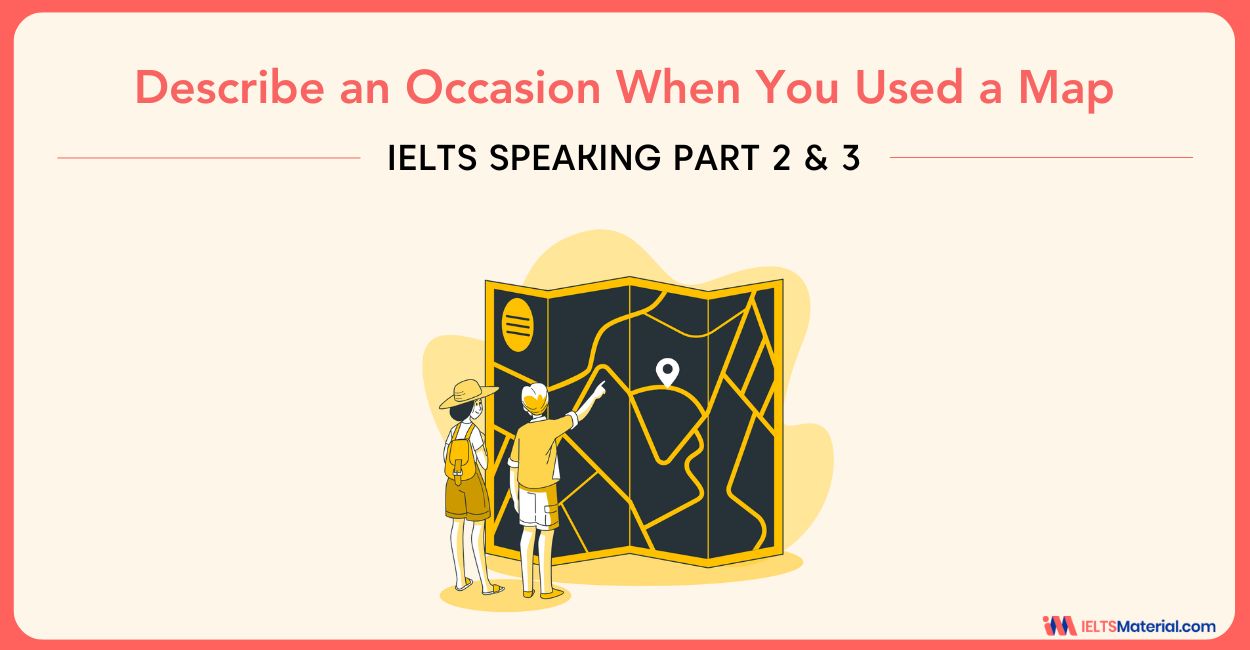
Kasturika Samanta
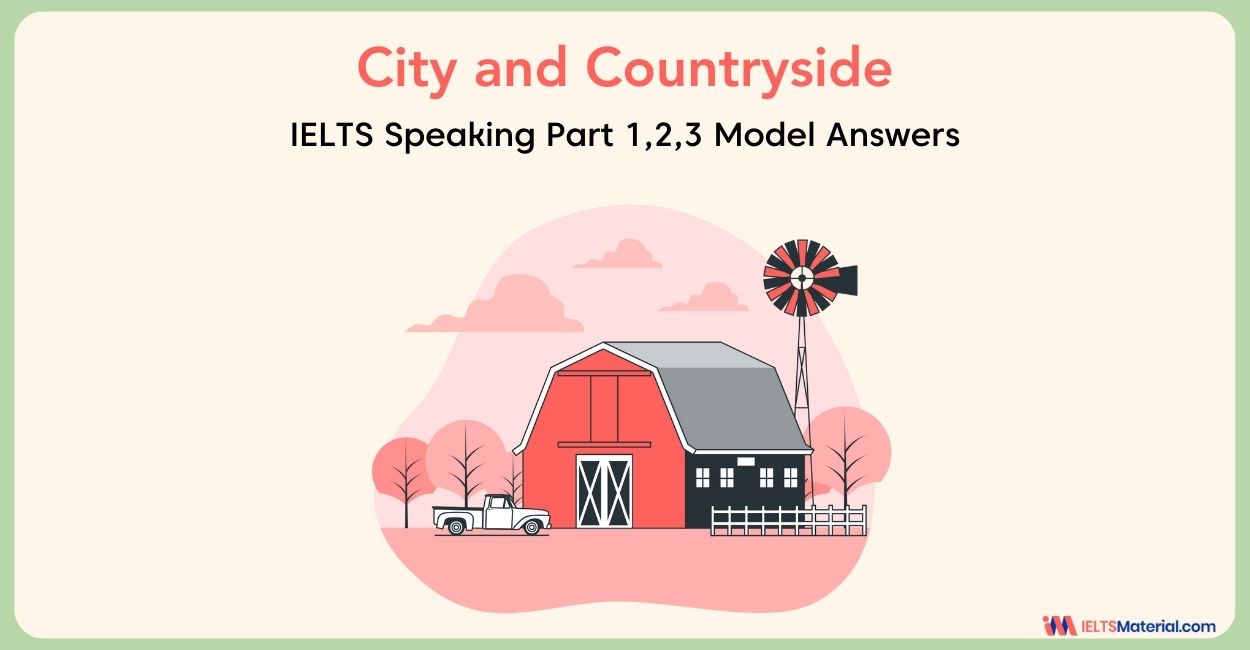
Janice Thompson

Post your Comments
Recent articles.
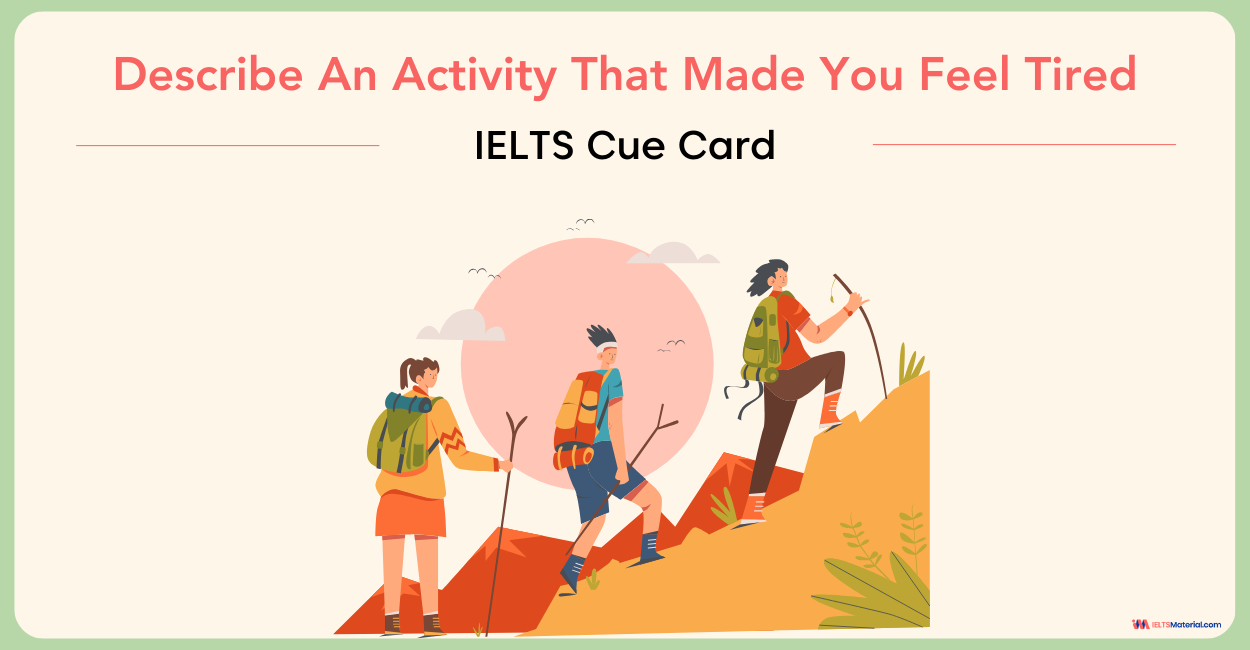
Raajdeep Saha
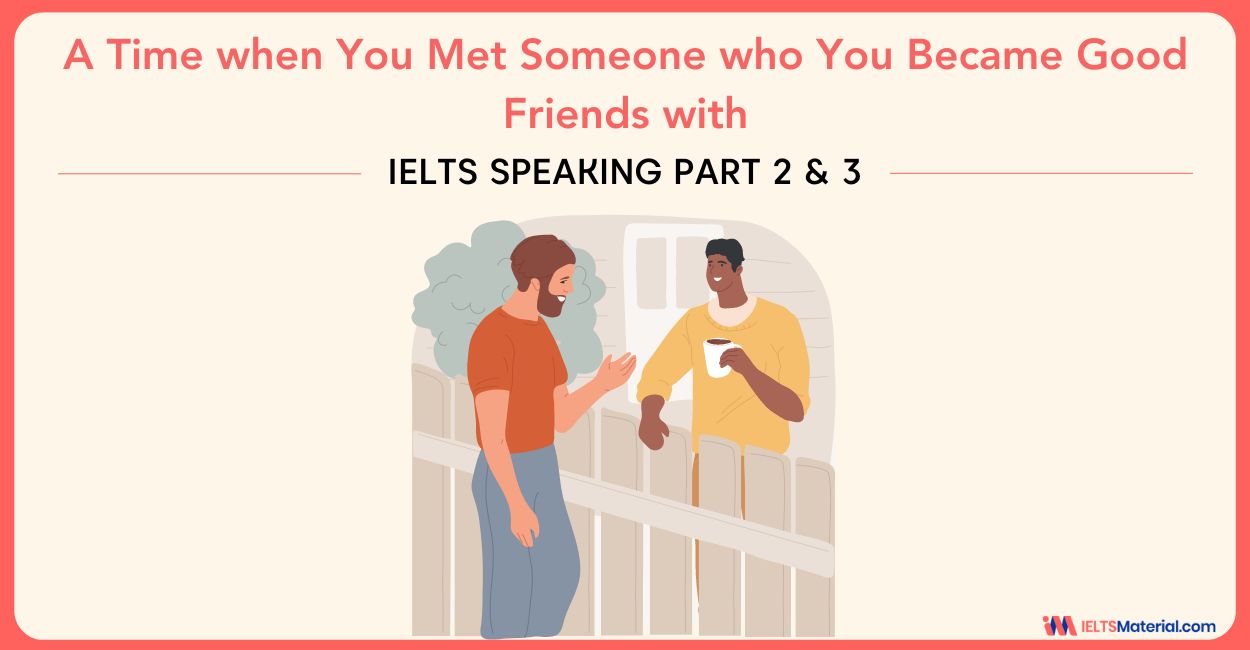
Our Offices
Gurgaon city scape, gurgaon bptp.
Step 1 of 3
Great going .
Get a free session from trainer
Have you taken test before?
Please select any option
Get free eBook to excel in test
Please enter Email ID
Get support from an Band 9 trainer
Please enter phone number
Already Registered?
Select a date
Please select a date
Select a time (IST Time Zone)
Please select a time
Mark Your Calendar: Free Session with Expert on
Which exam are you preparing?
Great Going!
IELTS Preparation with Liz: Free IELTS Tips and Lessons, 2024
- Test Information FAQ
- Band Scores
- IELTS Candidate Success Tips
- Computer IELTS: Pros & Cons
- How to Prepare
- Useful Links & Resources
- Recommended Books
- Writing Task 1
- Writing Task 2
- Speaking Part 1 Topics
- Speaking Part 2 Topics
- Speaking Part 3 Topics
- 100 Essay Questions
- On The Day Tips
- Top Results
- Advanced IELTS
Sample Answers for Travel and Transport in Speaking Part 1
Below are sample answers for the the topics of travel and transport for part 1 of the IELTS speaking test.
Q. Do you often travel abroad?
A. Not much, to be honest. I don’t get many days off in a year but when I do have time off, I mainly spend that time with my family in my hometown .
Q. When is the best season to travel in your country?
A. I guess it would be spring. That’s when the weather starts warming up and all the flowers start blossoming. It’s a really beautiful season and most places are at their best at that time. Unfortunately, it’s a busy time for tourists as well but that still doesn’t diminish the beauty of the countryside.
Q. Where would you recommend a foreign to visit in your country?
A . Without doubt, London. Not only is it our capital, but it also has some of the most iconic buildings in our country. I don’t think any visit to England is complete without seeing the Tower of London, London Bridge or Big Ben and the Houses of Parliament. They really are very impressive pieces of architectural work and can’t be missed.
Q. How did you get here today?
A . I came by bike because the roads are pretty congested at this time and a bike is quicker. It only took me about 15 minutes to get here.
Q . Do you often use public transport?
A. Yes, I do. I use the bus almost everyday. It’s the cheapest way to get around even though it’s really overcrowded and not particularly punctual.
Q. How could the transportation system be improved in your country?
A. Well, I think the first step to improvement would be to widen the roads and build to overpasses and underpasses to help traffic flow more freely which would reduce the congestion in the city center. Also, it would help if the bus service was improved to make it run more frequently which would help with the overcrowding in rush hour. I think those are the two main changes that need to happen.
Recommended
Speaking Part 1 Topic of Sleep with a Sample Answer and Vocabulary
Hello Liz. I take my speaking test tomorrow….I’m nervous much, but going through your Speaking tips is helping a whole lot. Wish me luck!
🤗🤗🇳🇬🇳🇬 you are the best!!
Tnank you so much for the tips…am doing my test in 2hrs time!!
Good luck!!
Good article , thanks and we wish extra! Added to FeedBurner as well
Hi Miss Liz you are an amazing of English teacher. Could please also give us samples of speaking part 3 questions. It would be greatly appreciated if you could do please. thank you very much.
See this page: https://ieltsliz.com/ielts-speaking-free-lessons-essential-tips/
How do you travel? Can you give me a answer of this question
This is a question from the topic if travel in speaking part 1. The question is “how do you usually travel?”. This means what kinds of transportation do you usually use in your everyday life.
Liz madam..my speaking is very weak and confidence is low. Give me suggestion how can i improve my speaking. tell me about sentence formation.
All my speaking tips are on this page; https://ieltsliz.com/ielts-speaking-free-lessons-essential-tips/
hi mam any links for speaking question with answers i need 9 band thanks
You can find plenty of model answers on my main speaking page: https://ieltsliz.com/ielts-speaking-free-lessons-essential-tips/
means of transport in the future
Thank you mam ….
hello, Liz my speaking exam held on next Monday and i am very afraid mam. can you advise me mam ,please. I need 6 band in speaking.
See my main speaking page: https://ieltsliz.com/ielts-speaking-free-lessons-essential-tips/ . Good luck!
Mam i want to ask a question. Do you feel that traveling and tourism promotes a uniform culture in the world?
Due to travel and tourism as well as international business and the development of technology, cultures around the world are becoming more similar.
Give me some more questions regarding the topic travel and turisom
Try some writing task 2 questions https://ieltsliz.com/100-ielts-essay-questions/tourism/ and https://ieltsliz.com/100-ielts-essay-questions/transport/
why you don’t but the listen record in this lesson , i think its better to record the lessons with any student you teach even with your self .. and thanks you a lot liz for this useful lessons .
What i have to do when a cue card handed over to me? How i remind in speaking all answers in mind,,,can i write ? Or hints are also valueable,,,
https://ieltsliz.com/liz-notice-2015-2016/
You are dedicated teacher.. I have ever seen…
Good day! I would like to thank you for sharing your tips and guide for us IELTS takers. I believed that your site made me felt confident that my score in IELTS improved. Your guide and tips are easy to follow, clear and clever. I am still waiting for 2 days more fir my IELTS GT results. By the way, I took my IELTS here in Pampanga, Philippines.
Hi Liz I’m a new student on your site and i have really enjoyed your lessons. I’m planing to take transfer from Russia to UK but before then, i need to take IELTS exames. How can you help me because am not all that good in the language. Please add me to your skype contact; godfred.ameyaw46. Thank you
All my lessons and tips are found on this blog or you can find advanced writing lessons on this page: http://subscriptions.viddler.com/IELTSLizStore , Unfortunately, I don’t work with skype. All the best Liz
Hi your teaching style is very helpfull I want to do test in a next month but I can’t understand where I can start ? Please guide me
Please watch my IELTS preparation video on the home page. Liz
I had my speaking test yesterday!
Part 1: 1. please tell me your full name please 2. are you a student or do you work? 3. What do you do at your work? 4. how important are social media sites? 5. which is good hand writing or typing? 6. why good hand writings are important? 7. in what situations people write by hands? 8. do you think in future, people will stop writing by hands? there were a couple of more questions which I don’t remember
Task 2. A country where I haven’t been and I wish to visit.
Task 3. Importance of tourism, what developments your government is doing to promote tourism, what are the advantages and disadvantages of tourism? There was one more question about tourusm, which I don’t remeber,
overall I think, my speaking was good. But I think my examiner was in hurry and she didn’t let me finish my answers in task 3, which was suppose to be long answers with descriptions and examples. also for task 2, she had to stop me because it was already 2 minutes and i was still speaking.
Liz, do you think this will affect my score?
My writing is on 26th.
Thank you! Palak
Thanks for sharing 🙂 In part 2, it examiner MUST stop you when 2 mins is reached. No students can have more than 2 mins. So, this is a normal part of the test and it won’t affect your score. It’s usually a good sign that you were still talking. For part 3, the examiner should give you a chance to explain your ideas for each question. But sometimes the examiner is happy with the language you are producing in an answer before you have finished. In that case, they will interrupt you and move quickly to another question which tests a different language point. I certainly shouldn’t worry. Let us know your results when they arrive. Good luck with your writing, listening and reading! All the best Liz
your site is very helpful. I’m having my ielts speaking test on friday and i’m continously practising for it from your site. Can you please tell, things I must not say and do while answering the examiner? this is my second time I scored 6 before but this time I need to score 6.5 or more.
The examiner is not interested in your ideas, only in your level of English. Add more to each answer. Speaking naturally as though to a friend. Add past tense, future forms, conditionals etc. Explain what you mean, give examples (particularly in part 2 and 3). Never answer with just a couple of words. Look carefully at my model answers for speaking test 1. Good luck! Liz
Hi Liz I have question Since I never been to my own country & I born & live in Bahrain so how could I talk about my own country? Can I talk about the country were I’m living , I mean considering Bahrain as my own country or hometown ? Thanks
You can talk about any place you want as your hometown. The examiner is not interested if you tell the truth or not. The examiner only wants to hear your English language. So, decide which place you want to be your hometown and use that in your answers. Don’t worry, this is a language test only. All the best Liz
There isn’t any tips or vocabulary about this topic
Not yet. I haven’t put up vocabulary on transport or travel but I will at some point. Liz
I have a question about IELTS Speaking Can we use words like “wanna”, “gonna”, “kinda” in the speaking? Will our scores reduce if we use that words?
Your score will go up. It is a form of pronunciation linking which is good for your pronunciation band score. Liz
Hi Liz, Can I have a certain time to prepare for my answers before speaking face to face with the examiner in speaking part 1?
There is no preparation time for answers in speaking, except in speaking part 2. You should answer the questions in part 1 and part 3 directly. If you need to time to think for one or two questions, you can ask the examiner to repeat the questions. It won’t affect your score and it will give you time to think. All the best Liz
Speak Your Mind Cancel reply
Notify me of new posts by email.
Advanced IELTS Lessons & E-books

Click Below to Learn:
- IELTS Test Information
Copyright Notice
Copyright © Elizabeth Ferguson, 2014 – 2024
All rights reserved.
Privacy Policy & Disclaimer
- Click here: Privacy Policy
- Click here: Disclaimer
Return to top of page
Copyright © 2024 · Prose on Genesis Framework · WordPress · Log in
Do You Like Traveling? IELTS Speaking (20 Example Answers)
One topic you might be asked about in part one of your IELTS Speaking test is travel. And a very common travel question is, “Do you like traveling?”
In this post, you’ll learn how to give a great band-seven answer. You’ll also see 20 good example answers ( go straight to the answers here ).
If You Do Like Traveling
Here are some possible reasons to like traveling. In your answer, talk about the reason which is true for you…
- It’s exciting to see new places
- You like new experiences
- You can try interesting food
- You gain a sense of freedom
- You can make friends from different places
- You have an adventure with your friends
- You can practice your English or other languages
- You can forget about work or studies for a while
- You can expand your mind and broaden your horizons
- You can take lots of great photos for social media
- You can make wonderful memories
- You can go to romantic places
- You can do some great shopping
- You can buy souvenirs
- You can go somewhere hot to get a tan
- You can get to the beach
- You can go to fun festivals around the world
- You get lots of interesting stories
- Anything else that comes to your mind
What More You Can Say
You can also talk about:
- Where you’ve traveled to before
- Where you’ve been recently
- The best place you’ve ever been
- Where you would love to visit in future
- How you like to travel (by air, car, train…)
- Where you usually stay when you travel
- What you usually do when you travel
- Who you like to travel with
- Anything else you can think of
What If You Don’t Like Traveling?
If you really don’t like traveling, no problem. Just say that you don’t, and then you could say…
- Why you don’t like traveling
- If you ever liked traveling in the past
- If you’ve traveled before, and if you like it or not
- What you’d rather do instead of traveling
- If you know anyone who likes traveling
- Why you think other people like traveling
- If there are perhaps just one or two places you’d like to visit
- Anything else that comes to mind
Keep It Short and Simple
These are lots of ideas. But don’t try to use them all!
Always remember that in part one, your answers should be quite short.
Part 1 should be like a natural conversation. It’s just supposed to warm you up .
So your answers can be short (just 10 to 20 seconds long) and simple.
If you keep your English simple here, it will be easier to focus on fluency .
Don’t worry about using clever vocabulary and grammar (that will come in parts two and three).
Use the Three-Step YES Method
To help you answer part-one questions, use the YES Method.
You can just say:
- Y our answer (‘yes, I do’ or ‘no, I don’t)
- E xplain your answer (say why you do or don’t like traveling)
- S top talking (wait patiently for the next question)
Let’s take a look at 20 good answers to this question about travel.
‘Yes, I Do’ Answers
1. Yes, I really like traveling because when I travel I can see fascinating, exotic countries and try all kinds of delicious dishes.
2. Yes, I’ve always loved traveling. I’ve already been to most of the countries in Europe and I’d like to travel around South America. I’m a big fan of Latin American culture, music, and cuisine.
3. Yes, I do. I think traveling broadens my mind and helps me to understand other people from different cultures. For these reasons, I think everyone should travel.
4. Yes, I really enjoy going on vacation with my family. Every year we travel somewhere new. Last summer we went to Nice in the South of France. The weather was lovely and the food was out of this world.
5. Yes, I certainly do like traveling. I haven’t been to any foreign countries yet, but I plan to travel a lot after I graduate from university.
6. Yes, I do. I love to visit romantic places like Paris and Venice with my boyfriend. And I really want to go to Norway, where you can see the Northern Lights in the night sky. That would be wonderful.
7. Yes, I do. I need to travel a lot for my work and that’s one of the best things about my job. When I visit a new city, I love taking some time for myself, to unwind and see the sights.
8. Yes, I love the sunshine, so I love traveling anywhere hot with a beach. I really enjoy lying on a sunny beach with a margarita and not a care in the world.
9. Yes, I often travel to Tokyo to go shopping. You can buy really good cosmetics in Tokyo for very affordable prices. I fill up my suitcase before I come home.
10. Yes, I have some really great memories from traveling on vacation in the past. I’ve been to many places in South East Asia with a few of my close friends. We’re planning another trip soon.
‘No, I Don’t’ Answers
11. To be honest with you, I’m not a big fan of traveling. I find it too tiring and stressful. All that packing and rushing to catch airplanes is too much for me. I’d rather just stay at home.
12. I’m not really interested in traveling. It’s pretty expensive and takes up a lot of time. But I know a lot of people who like it.
13. No, I don’t. I think traveling is dangerous. The world is a dangerous place and it’s much safer to stay in my own country, which I know well.
14. Since the pandemic started, I’ve lost interest in traveling. I don’t want to wear a mask on a long plane journey and take lots of Covid tests and stay in quarantine. It’s too much of a hassle.
15. No, I don’t like traveling because I don’t really see the point in going to another country full of strange people eating strange food and speaking a strange language.
‘Kind Of’ Answers
16. Well, yes and no. I like traveling because it’s fun and relaxing, but when I travel I also get behind on my work. I always feel like I’m wasting time and want to get back home as soon as I can.
17. I used to enjoy traveling a lot, but now that I’m older, traveling has kind of lost its appeal. These days, I’d rather just stay at home and watch documentaries about other countries on TV.
18. To be honest, I haven’t been to many places so I don’t really know if I like traveling or not. Maybe I’ll find out one day.
19. I guess I kind of like traveling. It’s a hassle preparing and getting to your destination. But once you’re there, it’s usually a lot of fun.
20. Yes, I do like traveling, but I simply don’t have enough free time or money to travel much. So I’d rather save my money and spend vacations in my hometown.
Your Turn To Answer
There you have 20 good answers. See if you can borrow some ideas from them.
And now it’s time to give this question a go yourself.
Set up the recorder on your phone and ask out loud, “Do you like traveling?”
Afterward, listen to your answer, and repeat it again. Try to improve a little each time.
This is one excellent way to prepare for part one of your IELTS Speaking test.
Related Posts
If the topic is traveling in part one of your IELTS Speaking test, then your…
"Do you like traveling by car?" is one question you might be asked in part…
In part one of your IELTS Speaking test, you'll sometimes be asked, "Where are you…
Food and cooking are possible topics in part one of your IELTS Speaking test. One…
One possible part-one topic in your IELTS Speaking test is flowers. If your examiner asks…


Giải đề IELTS Speaking Part 1 | Topic: Travelling
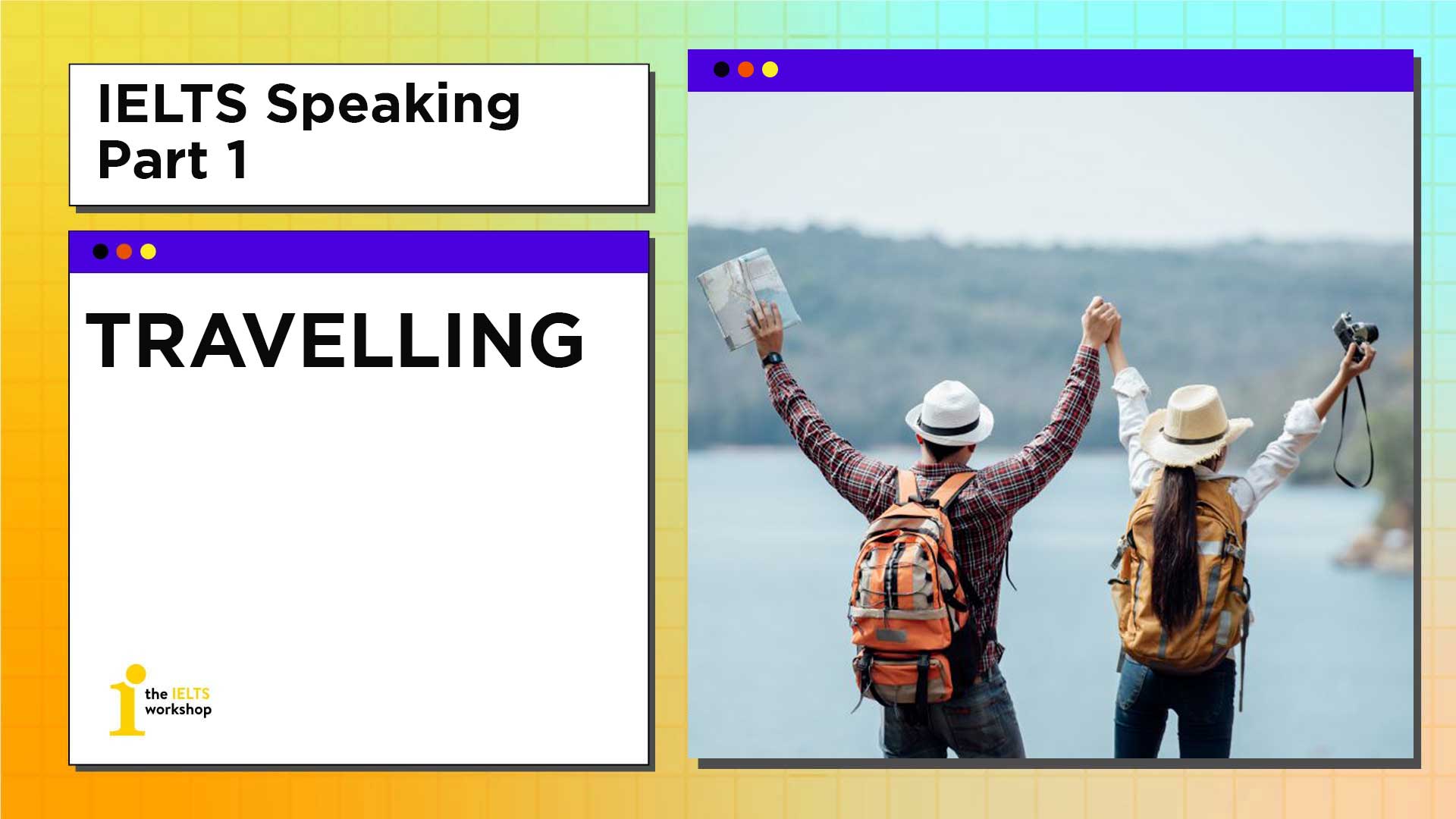
Nói về Chủ đề IELTS Speaking Part 1 Travelling trong bài thi IELTS Speaking , một số câu hỏi Part 1 mà thí sinh có thể gặp phải như:
- Do you like travelling?
- How often do you go travelling?
- Where do you usually travel?
- How do you feel when you are travelling?
Dưới đây là câu hỏi, ý tưởng và câu trả lời mẫu cho chủ đề IELTS Speaking Part 1 Travelling đến từ thầy Phước Đức – Giáo viên tại The IELTS Workshop TP. HCM , mà bạn có thể tham khảo. Bạn đọc có thể tham khảo bài mẫu phù hợp với bản thân mình nhé.
Giải đề IELTS Speaking Part 1 Travelling
1. do you like travelling.
Of course I do. In fact, I think of travelling as an escape from the mundanity of my everyday life. You know, if your day only revolves around studying or working, very soon you’re gonna go insane ; that’s why an annual or even monthly dose of travel experiences is what you should consider.
2. How often do you go travelling?
I would say ‘quite often’, probably once every other month . You know, my job requires lots of travel, and I always consider those business trips as leisure trips as well.
3. Where do you usually travel?
Well, it pretty much depends on my mood. For example, if I feel like ambling along a sandy beach and soaking up the peacefulness at a fishing village, I’ll plan to visit a gorgeous and tranquil coastal city like Da Nang or Quy Nhon, but if I long to absorb the fresh atmosphere of hills and mountains, I’ll probably opt for a serene mountainous region like Da Lat.
4. How do you feel when you travel?
Mostly relaxed, which is understandable, right? Usually when I travel, I try my best to push all my thoughts about work to the back of my mind so that I can completely enjoy my trip. Like I said, travelling is an escape from the daily grind , so I always make sure to feel as relaxed and comfortable as possible during my vacations.
Highlight Vocabulary – Từ vựng nổi bật
- Escape (n) : sự trốn thoát tạm thời khỏi 1 điều gì đó khó nhọc hoặc khó chịu (công việc, việc học, v.v)
- Mundanity (n) : sự nhàm chán
- Revolve around (phrasal v) : xoay quanh
- Insane (adj): phát điên (= crazy)
- Dose (n): 1 lượng
- Every other week/month/year/… : cứ mỗi 2 tuần/tháng/năm/…
- Leisure trip (n phrase) : 1 chuyến đi với mục đích vui chơi, thư giãn, không phải để làm việc.
- Amble (v): đi dạo
- Soak up (phrasal v) = absorb (v): tận hưởng
- Tranquil = serene (adj): yên bình
- Opt (v): (+ for) chọn
- Push something to the back of your mind (idiom): tạm quên đi điều gì đó khó nhọc hoặc khó chịu
- The daily grind (n phrase): one’s daily work routine (thứ tự hàng ngày trong công việc)
Tác giả: Thầy Phước Đức – Giáo viên tại The IELTS Workshop TP.HCM
Trên đây là câu trả lời về IELTS Speaking Part 1 tham khảo cho chủ đề Travelling đến từ thầy Phước Đức – Giáo viên tại The IELTS Workshop TP. HCM . Hy vọng bài viết này giúp bạn có thêm những kinh nghiệm để ôn luyện tốt hơn. Ngoài ra, bạn có thể tham khảo thêm nhiều bài hơn tại kho bài IELTS Speaking của The IELTS Workshop nhé.
Ngoài ra, khi đến với The IELTS Workshop, bạn còn có thể được đánh giá trình độ cũng như tư vấn lộ trình hoàn toàn MIỄN PHÍ. Đừng quên tham khảo khóa Senior của The IELTS Workshop để nâng band dễ dàng hơn nhé.

- #IELTS Speaking Part 1
- #IELTS Speaking Sample
Sao chép Sao chép Chia sẻ lên facebook Chia sẻ lên pinterest Chia sẻ lên linkedin Chia sẻ lên twitter
Có thể bạn quan tâm

Topic: Work and Study | Bài mẫu IELTS Speaking Part 1
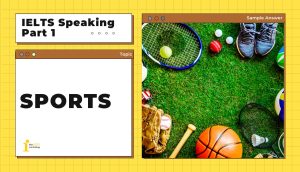
Topic: Sport | Bài mẫu IELTS Speaking Part 1

Topic: Leisure Time | Bài mẫu IELTS Speaking Part 1

Topic: Water | IELTS Speaking Part 1
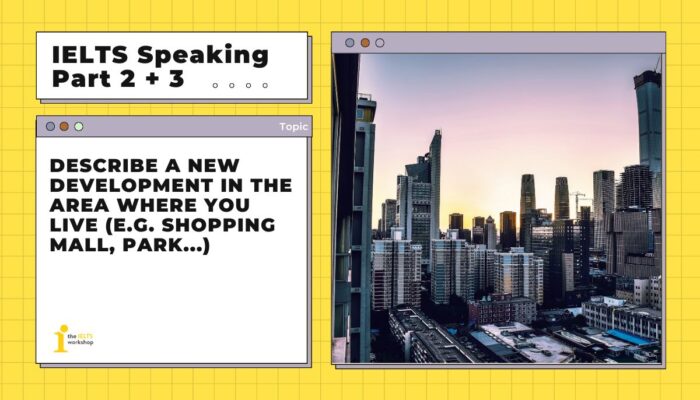
Describe a new development | Bài mẫu IELTS Speaking Part 2

Describe a painting or a work of art that you have seen | IELTS Speaking Part 2
Đăng ký tư vấn lộ trình miễn phí
Bạn hãy để lại thông tin, TIW sẽ liên hệ tư vấn cho mình sớm nha!

" * " indicates required fields
Đăng ký tư vấn miễn phí
Bạn hãy để lại thông tin, TIW sẽ tư vấn lộ trình cho mình sớm nha
Start today!
Stop stressing about IELTS, start learning the skills for IELTS success NOW!

IELTS SPEAKING PART 1 – Travelling

***In your IELTS interview, speak in FULL sentences – ALWAYS!
***Technically, the examiner does not mark you for the introduction, BUT in actuality, they are marking/judging your English ability from the first words that come out of your mouth.
***Make sure to focus on the question specifically and target the subject and object of the questions. (If you use templates, “Ex. There are a plethora of places I go to have fun…”), it is much more likely that the examiner will interrupt your answers.
***Do NOT say, “FOR EXAMPLE” – instead, just say the example. It’s more fluent and the examiner is less likely to interrupt your answers.
Examiner Questions:
Can I see your identification?
Yes, certainly, here is the page with my credentials, please take a look.
What is your full name?
As it is in my passport, my given name is Gregory and my family name is Wallace, please just call me Greg for short.
Where do you go for fun?
In order to relax and for some entertainment, I go to the recreation center that’s about a kilometer from my home. It has a swimming pool, a gym, billiard tables and even a small theater. I was there last Saturday with two of my friends.
Who do you like to spend time with? ***Paraphrase the question in your answer.
I enjoy the company of my friends and family, I have an older and a younger brother whom I spend much time with, especially on the weekends or in the evenings. We play sports together. I shot some hoops (to play basketball) with my younger brother last evening.
PARAPHRASE – To say the same idea in a different way!
- Synonyms 🡪 travel = adventure, journey, trip
- Antonym + negative 🡪 stay = don’t go
- Description 🡪 city = an urban area with dense population
- Expressions (idioms, phrasal verbs) 🡪 shoot some hoops = play basketball
- Grammar 🡪 How often do you travel away (present simple)? = I haven’t adventured much from my hometown these past two years. (present perfect.)
***In order to get a band 7 or more in your IELTS Speaking, you have to show several forms of paraphrasing to the examiner.
Poor – impoverished
Let’s talk about your traveling.
How often do you travel away from your city?
I frequently journey out of town, away from Victoria where I live, I would say at least five to ten times each month as I have friends and relatives living in many different places on Vancouver Island, and I love to go visit them.
Where do you like to go on vacation? (New slang staycation = a vacation where you stay at home )
I really enjoy taking time off and visiting places with a warm climate, preferably on a beach, such as Costa Rica or the Spanish Riviera, just because I really like swimming and surfing. I actually have a trip planned for next summer to hang out on the Mediterranean in Portugal with my family.
When is the best time to travel for you? Why?
The most opportune time in the year for me to go on a trip is in the month of June when I have less work and the weather is quite good for most places, it’s not too hot, nor too cold. My trip to Portugal is planned for the 15th of June.
What is your favorite way to travel? Why?
Have you ever traveled to another country? Why?
If you could visit any place on earth, where would you go? Why?
Get our amazing IELTS course at https://www.gieltshelp.com/full-course/
No Comments
Be the first to start a conversation
Leave a Reply
Click here to cancel reply.
You must be logged in to post a comment.
IELTS Blog Search
- IELTS exam (10)
- IELTS focus (8)
- IELTS Information (25)
- IELTS learning (15)
- IELTS Preparation and Studying for IELTS (18)
- IELTS Reading (2)
- IELTS Speaking Section (124)
- IELTS strategy (12)
- IELTS stress (3)
- IELTS study plan (4)
- IELTS Task 1 Writing (1)
- IELTS Task 2 (34)
- IELTS Teaching (4)
- IELTS test (3)
- IELTS vocabulary (4)
- IELTS Writing (23)
- Uncategorized (45)

- Intermediate
How often do you…

- 1.0 Overview
- 2.0 Usage and Examples
- 3.0 Conversation Questions
Conversation practice that focuses on “How often do you” questions is a great way for English learners to improve their overall level and fluency in the language. These types of questions encourage learners to use the present simple tense , which is one of the most basic and essential tenses in English. By practicing these questions, learners can gain a better understanding of how to form sentences correctly and use proper subject-verb agreement.
Additionally, this type of grammar-based conversation practice helps learners expand their vocabulary and learn new expressions that are commonly used in everyday conversations.
Usage and Examples
Beginner ESL students can answer “How often do you” questions by using the present simple tense, which is used to describe regular activities or habits.
The basic grammatical structure is “subject + present tense verb + adverb of frequency + object.”
For example:
How often do you go to the gym? I go to the gym three times a week. How often do you eat out? I eat out once a week. How often do you study English? I study English every day.
Common adverbs of frequency that can be used to answer these types of questions include:
- Hardly ever
Conversation Questions
- How often do you watch TV?
- How often do you exercise?
- How often do you eat out?
- How often do you call your family?
- How often do you clean your house/apartment?
- How often do you listen to music?
- How often do you read a book?
- How often do you take public transportation?
- How often do you cook at home?
- How often do you check your email?
- How often do you go to the movies?
- How often do you go shopping?
- How often do you visit your friends?
- How often do you use social media?
- How often do you go for a walk?
- How often do you travel?
- How often do you have a cup of coffee or tea?
- How often do you go to bed late?
- How often do you get up early in the morning?
- How often do you study English outside of class?
Keep The Conversation Going!

Gregory is a qualified TEFL teacher who has been teaching English as a Foreign Language (ESL) for over a decade. He has taught in-person classes in Spain and to English learners around the world online.
Start today!
Stop stressing about IELTS, start learning the skills for IELTS success NOW!

IELTS SPEAKING PART 1 – Travelling

***In your IELTS interview, speak in FULL sentences – ALWAYS!
***Technically, the examiner does not mark you for the introduction, BUT in actuality, they are marking/judging your English ability from the first words that come out of your mouth.
***Make sure to focus on the question specifically and target the subject and object of the questions. (If you use templates, “Ex. There are a plethora of places I go to have fun…”), it is much more likely that the examiner will interrupt your answers.
***Do NOT say, “FOR EXAMPLE” – instead, just say the example. It’s more fluent and the examiner is less likely to interrupt your answers.
Examiner Questions:
Can I see your identification?
Yes, certainly, here is the page with my credentials, please take a look.
What is your full name?
As it is in my passport, my given name is Gregory and my family name is Wallace, please just call me Greg for short.
Where do you go for fun?
In order to relax and for some entertainment, I go to the recreation center that’s about a kilometer from my home. It has a swimming pool, a gym, billiard tables and even a small theater. I was there last Saturday with two of my friends.
Who do you like to spend time with? ***Paraphrase the question in your answer.
I enjoy the company of my friends and family, I have an older and a younger brother whom I spend much time with, especially on the weekends or in the evenings. We play sports together. I shot some hoops (to play basketball) with my younger brother last evening.
PARAPHRASE – To say the same idea in a different way!
- Synonyms 🡪 travel = adventure, journey, trip
- Antonym + negative 🡪 stay = don’t go
- Description 🡪 city = an urban area with dense population
- Expressions (idioms, phrasal verbs) 🡪 shoot some hoops = play basketball
- Grammar 🡪 How often do you travel away (present simple)? = I haven’t adventured much from my hometown these past two years. (present perfect.)
***In order to get a band 7 or more in your IELTS Speaking, you have to show several forms of paraphrasing to the examiner.
Poor – impoverished
Let’s talk about your traveling.
How often do you travel away from your city?
I frequently journey out of town, away from Victoria where I live, I would say at least five to ten times each month as I have friends and relatives living in many different places on Vancouver Island, and I love to go visit them.
Where do you like to go on vacation? (New slang staycation = a vacation where you stay at home )
I really enjoy taking time off and visiting places with a warm climate, preferably on a beach, such as Costa Rica or the Spanish Riviera, just because I really like swimming and surfing. I actually have a trip planned for next summer to hang out on the Mediterranean in Portugal with my family.
When is the best time to travel for you? Why?
The most opportune time in the year for me to go on a trip is in the month of June when I have less work and the weather is quite good for most places, it’s not too hot, nor too cold. My trip to Portugal is planned for the 15th of June.
What is your favorite way to travel? Why?
Have you ever traveled to another country? Why?
If you could visit any place on earth, where would you go? Why?
Get our amazing IELTS course at https://www.aehelp.com/full-course
One Response to “IELTS SPEAKING PART 1 – Travelling”
I love to travel, I love travelling by road. so I love road trips. Yes I Have travelled to another country. I have travelled to the united state of America. I travelled to see my siblings. I would love to travel to Holland. I hear their food is great i would love to go and see for myself.
Leave a Reply
Click here to cancel reply.
You must be logged in to post a comment.
IELTS Blog Search
- IELTS focus (9)
- IELTS Information (27)
- IELTS Learning (22)
- IELTS Listening (1)
- IELTS Materials (9)
- IELTS Preparation and Studying for IELTS (26)
- IELTS Reading (4)
- IELTS Scores over 6.5 (10)
- IELTS Speaking (116)
- IELTS strategy (11)
- IELTS stress (4)
- IELTS Study (9)
- IELTS Task 1 Writing (14)
- IELTS Task 2 (30)
- IELTS teaching (4)
- IELTS tutors (3)
- IELTS Vocabulary (6)
- Uncategorized (63)

IELTS Speaking Part 1: Traveling
12/18/2023 07:46 PM
General Rules:

Here are some general rules about Part 1 that you may find useful. The point of Task 1 is for you to answer shortly to many questions. Think of it like an interview where you need to answer questions about yourself. You should:
Keep it short. When you practice, in general try to answer in 15 to 20 seconds per question.
Give at least 1 reason and 1 real-life example. again very general but try to have at least 1 real example in your answer., talk about yourself. this part is all related to you (if the question doesn't say another person)..
So, lets take a look at some questions:
Vocabulary related to the topic
Sentence starters and linking words, idioms and phrases, business phrases, do you like traveling.
My Personal Answer:
How often do you go traveling?
As a student:
Not that often. I am still a student and I'm still preoccupied with lessons and learning. My parents don't have so much time to take me traveling either , and so we haven't been abroad so much. When we have some time, usually during vacations , we travel internally in my country.
What destinations do you prefer to travel to?
How do you feel when you are traveling, what are the benefits of traveling, is traveling good for the environment.
Well, as long as people take care of their surroundings and keep their personal trash at a minimum , then traveling can be an acceptable way to enjoy our time. We need to be more environmentally conscious when picking our destinations and how often we travel, that's for sure .
- [email protected]
- 0974.824.724

- Giới Thiệu Chung
- Báo Chí Nói Về IELTS Thanh Loan
- Câu hỏi thường gặp
- Khoá IELTS Foundation (Pre IELTS)
- Khóa IELTS Overall (mục tiêu 6.0+)
- Khóa IELTS Advanced (mục tiêu 6.5+)
- Khóa IELTS Cấp Tốc
- Khóa IELTS 1 kèm 1
- Khóa IELTS General Training
- Khóa học IELTS Target 5.0
- Khóa học IELTS Target 6.0
- Khóa học IELTS Target 7.0
- Sách Listening
- Sách Speaking
- Sách Reading
- Sách Writing
- Sách Vocabulary
- Chữa bài Writing
- IELTS Listening
- IELTS Speaking
- IELTS Reading
- IELTS Writing
- IELTS Vocabulary
- IELTS Grammar
- Tài liệu IELTS
- Kinh nghiệm
Bạn cần tìm kiếm thông tìn gì?
Từ vựng và ý tưởng IELTS Speaking theo chủ đề – Travelling
Khi chủ đề Du lịch – Travelling xuất hiện trong IELTS Speaking, giám khảo có thể đặt hàng loạt câu hỏi khác nhau. Một số câu hỏi có thể vô cùng đơn giản như Do you like travelling? How often do you travel? Who do you usually travel with? Nhưng nếu câu hỏi thuộc phần part 2 3 thì cách đặt câu hỏi sẽ phức tạp hơn.
Nhưng bạn có phát hiện rằng một cách chuẩn bị rất hay ho cho Speaking đó là chuẩn bị một số ý tưởng xoay quanh các sub-topics (chủ đề nhỏ) và sau đó mình có thể “thiên biến vạn hoá” khi đối mặt với nhiều câu hỏi khác nhau. Ví dụ với chủ đề Du lịch – Travelling, chúng ta sẽ có những sub-topics như là:
- travelling companion
- favourite types of holiday
- travelling alone and in groups
Trong bài viết này, IELTS Thanh Loan xin gợi ý với bạn những ý tưởng thông dụng nhất về 2 vấn đề, đó là: “ frequency ” và “ travelling companion “.
1. Frequency
Well, I do some travelling on a monthly basis in order to escape from the hustle and bustle of the city . You know, it’s kinda a great way for me to recharge my batteries and be willing to start a new week.
À, tôi đi du lịch hàng tháng để thoát khỏi cuộc sống xô bồ của thành phố. Bạn biết đấy, đó là một cách tuyệt vời để tôi nạp năng lượng và sẵn sàng bắt đầu một tuần mới.
I go travelling from time to time . Though I’m fully occupied with my full-time work and taking care of my kids, I still spend a bit of time unwinding in remote areas whenever I’m in need of some rejuvenation .
Tôi thỉnh thoảng mới đi du lịch. Mặc dù tôi rất bận rộn với công việc toàn thời gian và việc chăm sóc con cái, tôi vẫn dành một chút thời gian để xả stress ở những vùng xa xôi bất cứ khi nào tôi cần nạp lại năng lượng .
Well, to be quite honest, I do some travelling once in a blue moon . As I’m up to my ears in the study, I don’t find much idle time to go travelling more frequently. But in the near future, after I leave school, I will spend more time travelling.
Thành thật mà nói, tôi hiếm khi đi du lịch . Vì tôi bận học , tôi không thể dành nhiều thời gian để đi du lịch thường xuyên hơn. Nhưng sắp tới, sau khi tốt nghiệp , tôi sẽ dành nhiều thời gian hơn để đi du lịch.
Giải thích từ vựng:
- escape from the hustle and bustle of the city (verb phrase): thoát khỏi cuộc sống xô bồ của thành phố ENG: avoid the busy noisy activity of a lot of people in the city
- recharge one’s batteries (idiom): nạp lại năng lượng ENG: to rest and relax for a period of time so that you feel energetic again
- from time to time (idiom): thỉnh thoảng ENG: occasionally
- fully occupied with something (adj): quá bận rộn với việc gì ENG: busy with something
- take care of somebody (phrasal verb): chăm sóc ai đó ENG: look after somebody
- rejuvenation (unc. noun): sự nạp lại năng lượng ENG: the act or process of making someone look or feel young and energetic again
- once in a blue moon (idiom): hiếm khi ENG: rarely
- up to one’s ears in something (idiom): quá bận rộn với việc gì ENG: busy with something
- idle time (unc. noun): thời gian rảnh ENG: free time
Câu hỏi luyện tập: Do you often go travelling/ How often do you go travelling?
2. Travelling companion
Well, actually I’m a solo traveller since I just wanna explore a new destination on my own. As for me, choosing the right travel partner is really difficult and wastes a great deal of time, I opt for travelling independently instead of going with other people.
Thực ra tôi hay đi du lịch một mình vì tôi muốn tự mình khám phá một điểm đến mới. Đối với tôi, việc lựa chọn một bạn đồng hành du lịch thực sự rất khó và lãng phí rất nhiều thời gian, tôi chọn đi du lịch một mình thay vì đi cùng người khác.
In order to have a great experience and make snap decisions , I think it’s crucial to be on the same page with a travel buddy . That’s why I always go travelling with my close friends. They’re the ones who make my travel experience much more fulfilling and fun.
Để có trải nghiệm tuyệt vời và đưa ra quyết định nhanh chóng, tôi nghĩ điều quan trọng là phải hợp với bạn đồng hành khi đi du lịch. Đó là lý do tại sao tôi luôn đi du lịch cùng những người bạn thân của mình. Họ là những người làm cho trải nghiệm du lịch của tôi trở nên trọn vẹn và thú vị hơn nhiều.
- a solo traveller (noun): người đi du lịch một mình ENG: a person who travels alone
- a travel partner = a travel buddy (noun): bạn đồng hành đi du lịch ENG: another adult who travels with you
- opt for (doing) something (verb): chọn làm gì ENG: choose to do something
- make snap decisions (verb phrase): đưa ra quyết định nhanh chóng ENG: decide quickly
- on the same page with somebody (idiom): hợp với ai ENG: to have the same ideas as someone else
- fulfilling (adj): vui vẻ ENG: causing somebody to feel satisfied and useful
Câu hỏi luyện tập: Who do you travel with?
- Từ vựng IELTS Speaking
- Từ vựng IELTS Writing

- About FoodRavel
- Privacy Policy

Where food and travel meet…

IELTS Mentor "IELTS Preparation & Sample Answer"
- Skip to content
- Jump to main navigation and login
Nav view search
- IELTS Sample
IELTS Speaking Samples and Answers
Ielts speaking test - sample 96, ielts speaking test # 96, part one - introduction, part 2 - cue card / candidate task card, describe a journey [e.g. by car, plane, boat] that you remember well..
- where you went
- how you travelled
- why you made the journey
Part 3 - Two-way Discussion:
- IELTS Speaking
- Speaking Sample
- IELTS Speaking Mock Test
IELTS Materials
- IELTS Bar Graph
- IELTS Line Graph
- IELTS Table Chart
- IELTS Flow Chart
- IELTS Pie Chart
- IELTS Letter Writing
- IELTS Essay
- Academic Reading
Useful Links
- IELTS Secrets
- Band Score Calculator
- Exam Specific Tips
- Useful Websites
- IELTS Preparation Tips
- Academic Reading Tips
- Academic Writing Tips
- GT Writing Tips
- Listening Tips
- Speaking Tips
- IELTS Grammar Review
- IELTS Vocabulary
- IELTS Cue Cards
- IELTS Life Skills
- Letter Types

- Privacy Policy
- Cookie Policy
- Copyright Notice
- HTML Sitemap
How long will cicadas be around this year? Here's when to expect Brood XIX, XIII to die off

Trillions of periodical cicadas from two broods are emerging from their underground habitats in over a dozen states this year, filling the air and creating a lot of noise in the process.
There are two broods hitting a combined 17 states this year: the 13-year Brood XIX located mainly in the Southeast, and the 17-year Brood XIII in the Midwest. The two broods, which have not emerged together since 1803, will be found in both Illinois and Iowa.
You may have already seen some of these cicadas emerging, but how long will they be around this year, and how long do they stay underground between emergence years?
Here's what to know about a cicada's life, both under and above ground.
2024 cicada map: See where Brood XIX, XIII cicadas are emerging around the US
When do cicadas emerge?
According to Cicada Mania , the cicadas begin to emerge from their underground habitats when the soil 8 inches underground reaches 64 degrees, and are often triggered by a warm rain.
Thanks to warm temperatures, cicadas have already been spotted above ground in states across the Southeast and Midwest.
Can you eat cicadas? Try these tasty recipes with Brood XIX, Brood XIII this summer
How long will the cicadas be above ground?
How long cicadas live depends on their brood and if they are an annual or periodical species.
The two periodical broods this summer are Brood XIX, which have a 13-year life cycle, and Brood XIII, which have a 17-year life cycle.
Once male and female periodical cicadas have mated and the latter has laid its eggs, the insects will die after spending only a few weeks above ground − anywhere from three to six weeks after first emerging.
That means many of this year's periodical cicadas are set to die in June, though some could die off in late May or July, depending on when they emerged.
The nymphs of annual cicadas remain underground for two to five years , according to the Missouri Department of Conservation. These cicadas are called " annual " because some members of the species emerge as adults each year.
What is the life cycle of a cicada?
The life cycle of a cicada starts with mating. The female then lays eggs in holes made in tree branches and shrubs, National Geographic reports . The eggs will hatch after six to 10 weeks and the cicada nymphs will burrow themselves into the ground, attaching to the tree's roots.
The cicadas will remain underground for a " dormant period " of two to 17 years, depending on the species. Then they emerge in adult form, according to National Geographic.
2024 emergence map: Check out where Broods XIX, XIII are emerging
The two cicada broods were projected to emerge in a combined 17 states across the South and Midwest. They emerge once the soil eight inches underground reaches 64 degrees, expected to begin in many states in May and lasting through late June.
The two broods last emerged together in 1803 , when Thomas Jefferson was president.
Contributing: Olivia Munson, USA TODAY.
Today’s best savings rates
How long will savings rates stay high , how often do savings rates change , benefits of opening a high-yield savings account now , what to consider before choosing a high-yield savings account, methodology, best savings rates today -- now’s your chance to earn up to 5.55% apy, may 21, 2024.
High savings rates won't stick around forever, so now's the time to switch to one of these high-yield savings accounts.

Liliana Hall
Associate Writer
Liliana Hall is a writer for CNET Money covering banking, credit cards and mortgages. Previously, she wrote about personal credit for Bankrate and CreditCards.com. She is passionate about providing accessible content to enhance financial literacy. She graduated from the University of Texas at Austin with a bachelor's degree in journalism, and has worked in the newsrooms of KUT and the Austin Chronicle. When not working, she is probably paddle boarding, hopping on a flight or reading for her book club.
Kelly Ernst
Kelly is an editor for CNET Money focusing on banking. She has over 10 years of experience in personal finance and previously wrote for CBS MoneyWatch covering banking, investing, insurance and home equity products. She is passionate about arming consumers with the tools they need to take control of their financial lives. In her free time, she enjoys binging podcasts, scouring thrift stores for unique home décor and spoiling the heck out of her dogs.
CNET staff -- not advertisers, partners or business interests -- determine how we review the products and services we cover. If you buy through our links, we may get paid.
Key takeaways
- Today’s top high-yield savings accounts earn up to 5.55% APY.
- The top-yielding savings accounts earn APYs more than 10 times the national average.
- Consider more than just APY when opening a new high-yield savings account. Look at account fees, minimum deposit requirements and monthly withdrawal limits.
The right savings account can make a big difference in your bottom line. If you want to meet your savings goals faster, don’t settle for the paltry rates most big banks offer.

Some big banks offer as little as 0.01% annual percentage yield, or APY, but the best high-yield savings accounts earn APYs up to 5.55% -- more than 10 times the national average of 0.45%. So, if you’re serious about growing your emergency fund or starting a sinking fund , now’s the time to maximize your interest earnings with a high APY.
Read on to learn where you can find today’s top savings rates.
Experts recommend comparing rates before opening a savings account to get the best APY possible. You can enter your information below to see CNET’s partners’ rates in your area.
Here are some of the top savings account APYs available right now:
The Federal Reserve has opted to keep the federal funds rate at a range of 5.25% to 5.50% at its last six meetings. As a result you can still find high-yield savings accounts with APYs as high as 5.55%.
Experts expected several rate cuts to happen later this year, which would prompt savings rates to follow suit. But the most recent Consumer Price Index report revealed inflation rose 3.4% year over year -- down slightly from March’s numbers but still stubbornly higher than the Fed’s 2% target rate. Inflation has eased significantly since 2022, but the timeline for future rate cuts is still unclear.
Some experts still think rate cuts are possible in 2024, according to Elaine King , a certified financial planner. However, some economists predict that rate cuts are now less likely to happen in 2024 unless inflation begins trending downward soon. Either way, you can expect high savings rates to stick around for the foreseeable future.
The Fed doesn’t directly impact savings rates, but its decisions have ripple effects. For instance, when the Fed raises rates, many banks increase their rates for traditional and high-yield savings accounts, said Lanesha Mohip, a corporate accountant, founder of the Polished CEO and CNET expert review board member. Inversely, when the Fed lowers rates, banks drop savings rates, too.
“When the Fed changes the rates, it impacts everything,” said Mohip. That includes borrowing and savings rates. While taking out a loan or paying back debt may be more expensive, the high rates can also put extra money in your savings.
Banks can change the interest rates on savings accounts at any time. Since savings rates are variable, your APY will likely go down once the Fed drops rates. But for now, many banks are holding rates steady in anticipation of what the Fed will do next. Based on CNET’s weekly tracking, here’s where rates stand compared to last week:
Smart Money Advice on the Topics That Matter to You
CNET Money brings financial insights, trends and news to your inbox every Wednesday.
By signing up, you will receive newsletters and promotional content and agree to our Terms of Use and acknowledge the data practices in our Privacy Policy . You may unsubscribe at any time.
Your new Subscription
Here’s all of the excitement headed to your inbox.
Where you keep your money matters. A high-yield savings account is a great place to park money reserved for your emergency fund or any short-term savings goals. It could also be a good place to stash monetary windfalls, such as your tax refund . Here’s what else makes HYSAs stand out:
- High rates: HYSAs often have APYs 10 times higher (or more) than the national average, as tracked by the Federal Deposit Insurance Corporation.
- Low or no fees: Monthly maintenance fees can eat into your savings. Many online banks can charge low or no fees thanks to their lower operating costs.
- Liquidity: You can access money in your HYSA anytime without penalty (as long as you mind any withdrawal limits).
- Accessibility: If you open an HYSA at an online bank, you’ll have 24/7 access through its mobile app. You may also have lots of customer service options, including by phone, online chat and secure messaging.
- Low risk: HYSAs are protected by federal deposit insurance if they’re held at an FDIC-insured bank or credit union insured by the National Credit Union Administration. That means your money is safe up to $250,000 per account holder, per account type.
Some accounts have minimum deposit requirements, fees and other charges that can chip away at your savings.
Here’s everything you should keep in mind when comparing savings accounts:
- Minimum deposit requirements: Some HYSAs require a minimum amount to open an account -- typically, from $25 to $100. Others don’t require anything.
- ATM access: Not every bank offers cash deposits and withdrawals. If you need regular ATM access, check to see if your bank offers ATM fee reimbursements or a wide range of in-network ATMs, said Mohip.
- Fees: Look out for fees for monthly maintenance, withdrawals and paper statements, said Mohip. The charges can eat into your balance.
- Accessibility: If you prefer in-person assistance, look for a bank with physical branches. If you’re comfortable managing your money digitally, consider an online bank.
- Withdrawal limits: Some banks charge an excess withdrawal fee if you make more than six monthly withdrawals. If you think you may need to make more, consider a bank without this limit.
- Federal deposit insurance: Make sure your bank or credit union is either insured with the FDIC or the NCUA. This way, your money is protected up to $250,000 per account holder, per category, if there’s a bank failure.
- Customer service: Choose a bank that’s responsive and makes it easy to get help with your account if you need it. Read online customer reviews and contact the bank’s customer service to get a feel for working with the bank.
CNET reviewed savings accounts at more than 50 traditional and online banks, credit unions and financial institutions with nationwide services. Each account received a score between one (lowest) and five (highest). The savings accounts listed here are all insured up to $250,000 per person, per account category, per institution, by the FDIC or NCUA.
CNET evaluates the best savings accounts using a set of established criteria that compares annual percentage yields, monthly fees, minimum deposits or balances and access to physical branches. None of the banks on our list charge monthly maintenance fees. An account will rank higher for offering any of the following perks:
- Account bonuses
- Automated savings features
- Wealth management consulting/coaching services
- Cash deposits
- Extensive ATM networks and/or ATM rebates for out-of-network ATM use
A savings account may be rated lower if it doesn’t have an easy-to-navigate website or if it doesn’t offer helpful features like an ATM card. Accounts that impose restrictive residency requirements or fees for exceeding monthly transaction limits may also be rated lower.
Recommended Articles
Best high-yield savings accounts for may 2024, don’t go broke saying ‘i do.’ here’s how 3 real couples kept wedding costs down, rocket money lowered my spectrum bill. but it came at a price, tiktok made them successful. now your favorite creators face a new hurdle, balancing splurging and spending is hard. i’m an accountant, here’s my advice, 6 female finance influencers changing the way we think about money.
CNET editors independently choose every product and service we cover. Though we can’t review every available financial company or offer, we strive to make comprehensive, rigorous comparisons in order to highlight the best of them. For many of these products and services, we earn a commission. The compensation we receive may impact how products and links appear on our site.
Writers and editors and produce editorial content with the objective to provide accurate and unbiased information. A separate team is responsible for placing paid links and advertisements, creating a firewall between our affiliate partners and our editorial team. Our editorial team does not receive direct compensation from advertisers.
CNET Money is an advertising-supported publisher and comparison service. We’re compensated in exchange for placement of sponsored products and services, or when you click on certain links posted on our site. Therefore, this compensation may impact where and in what order affiliate links appear within advertising units. While we strive to provide a wide range of products and services, CNET Money does not include information about every financial or credit product or service.
- My View My View
- Following Following
- Saved Saved
UK general election 2024: How does it work and what’s next?
- Medium Text
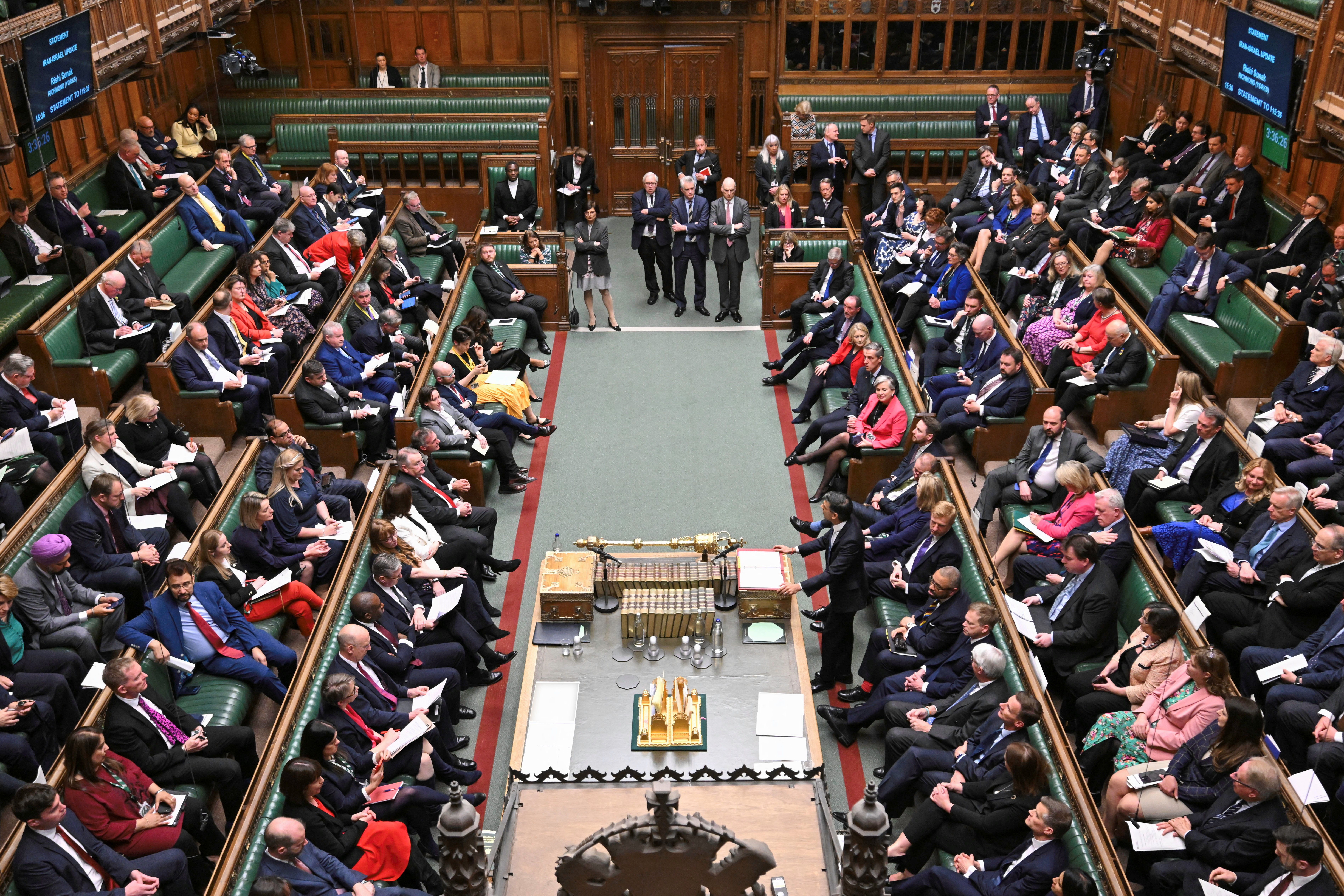
HOW DOES THE ELECTORAL SYSTEM WORK?
Who can vote, when will results be announced, what happens if no party secures a majority, role of the king, what is expected to happen.
Sign up here.
Reporting by Muvija M; editing by William James, Alexandra Hudson and Janet Lawrence
Our Standards: The Thomson Reuters Trust Principles. New Tab , opens new tab
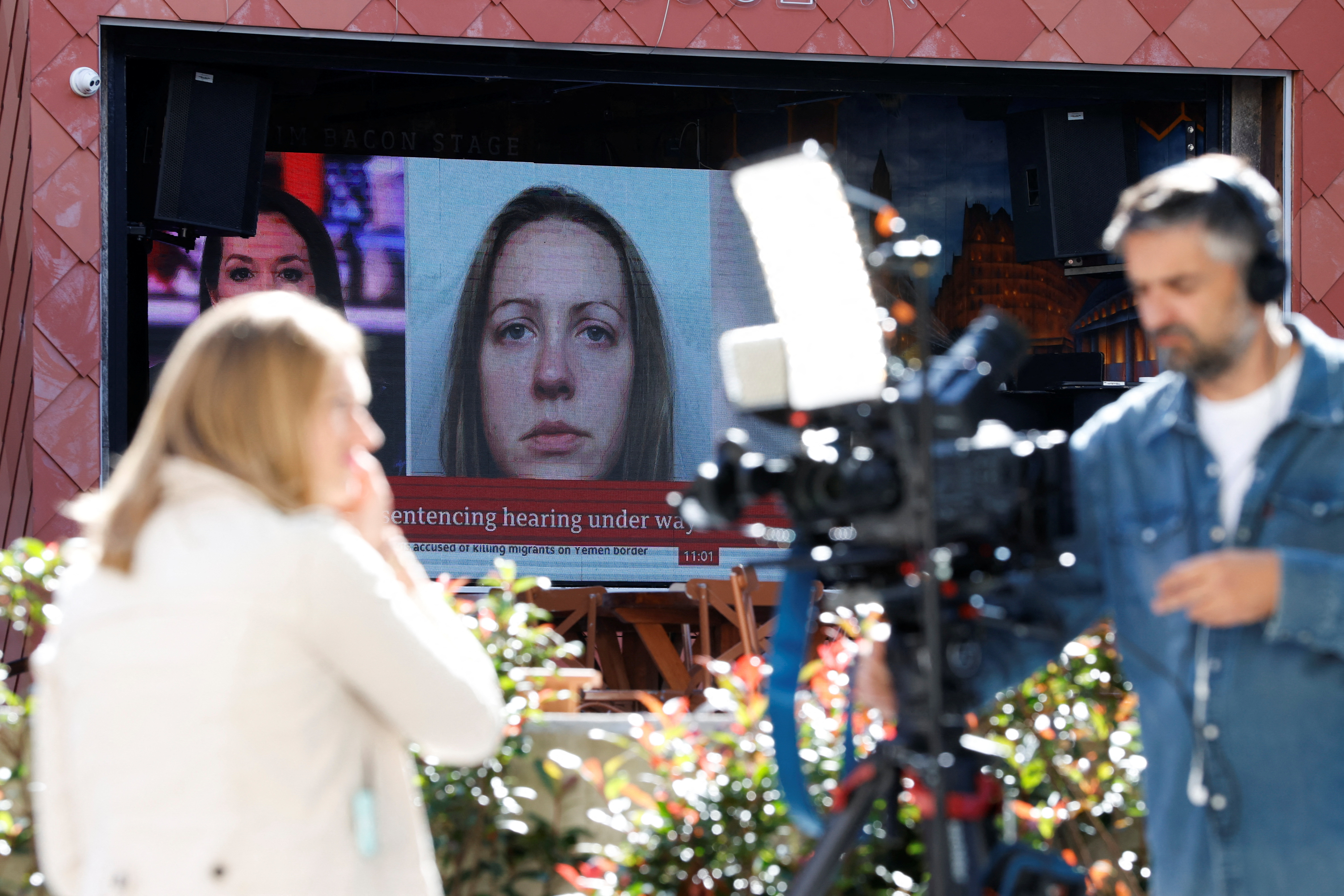
World Chevron
Two German tourists, a Spanish waitress and a Senegalese man were killed when a two-storey restaurant building collapsed on the beach in Palma de Mallorca on Thursday, a spokesperson for the city council said.
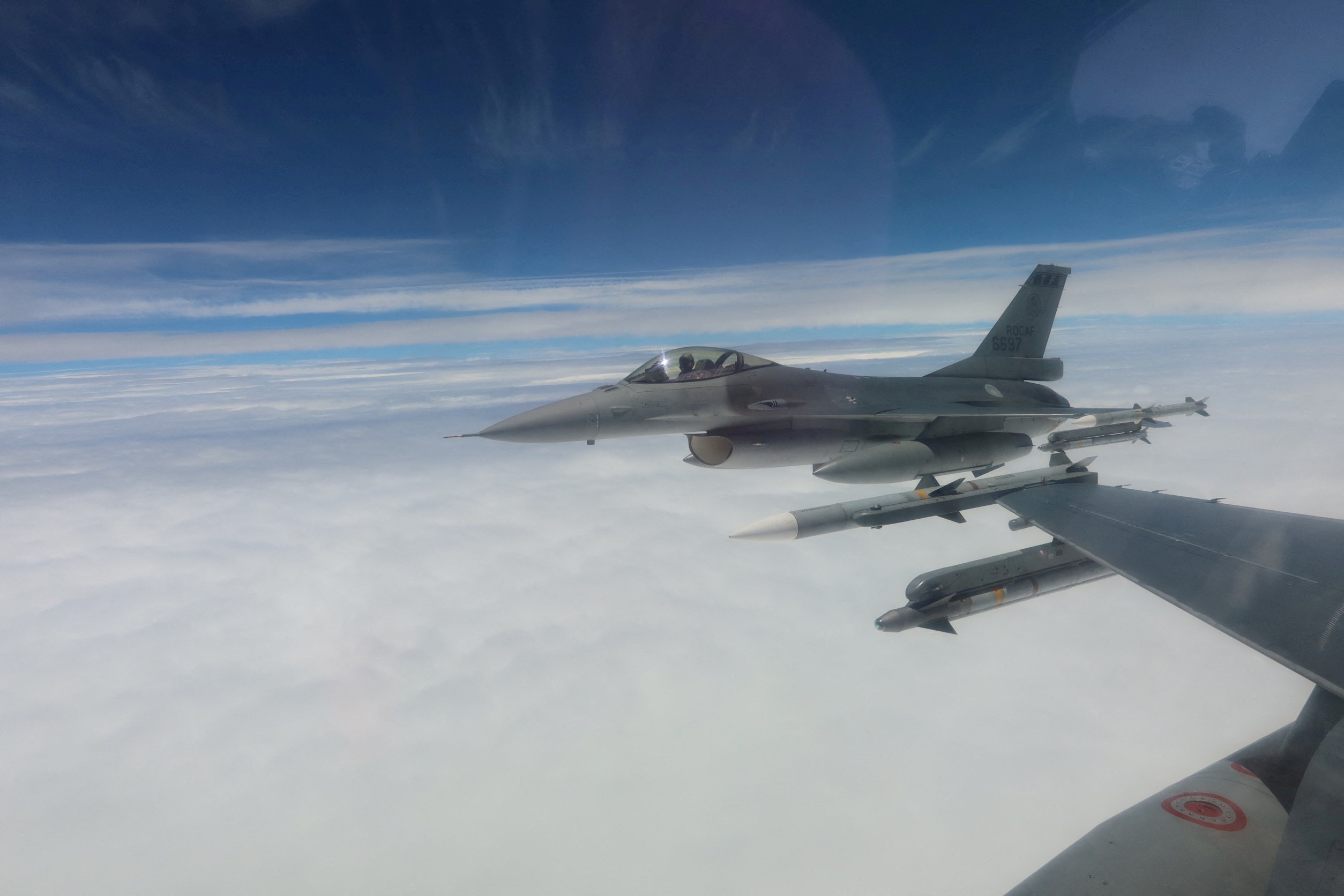
How to Clean Your Car Interior Like a Professional
Be your own detailer with these expert cleaning tips.

We've been independently researching and testing products for over 120 years. If you buy through our links, we may earn a commission. Learn more about our review process.
Step-by-step instructions
How often to clean, additional tips to keep your car interior clean, why trust good housekeeping.
I generally think of myself as a neat person, but my car is a definite pain point. The dirt, debris, crumbs and muddy prints are ever-multiplying — largely thanks to the four little kids I tow around.
The mess used to feel insurmountable, but over the years, I've developed a routine that helps keep my tiny home on wheels from becoming completely overrun by the mess — no expensive professional detailing necessary.
What you'll need
For the most part, common household cleaners like a microfiber cloth and an all-purpose cleaner are all you need to get the job done. But a few car-cleaning extras , including compressed air, can help tackle hard-to-reach areas like vents and cup holders for a more thorough clean. (You can even purchase a car cleaning kit for added convenience.) It's also important to keep in mind that some cleaners contain harsh ingredients that can damage certain surfaces — leather upholstery and GPS screens in particular.
In general, we recommend stocking the following items for at-home car detailing:
Common Household Cleaning Products
- Upholstery cleaner
- Handheld vacuum
- Glass cleaner
- Microfiber cloths
- Disinfecting wipes
- Small brush set

Glad ForceFlex Protection Series Tall Kitchen Trash Bags

Bissell Little Green Multi-Purpose Portable Carpet and Upholstery Cleaner

Dirt Devil Grab & Go+ 8V Cordless Handheld Vacuum Cleaner

Invisible Glass Glass Cleaner

Amazon Basics Microfiber Cleaning Cloths

Simple Green All-Purpose Cleaner Concentrate

Dawn Platinum Dishwashing Liquid Dish Soap

Lysol Disinfectant Plant Based Wipes

OXO Good Grips Deep Clean Brush Set
Professional car interior cleaning products.
- Compressed air
- Leather cleaner
- Leather protector
- Fabric protector
- All-purpose cleaner

Falcon Dust-Off

Furniture Clinic Leather Cleaner

Furniture Clinic Leather Protection Cream

CarGuys Super Cleaner

Scotchgard Auto Fabric & Carpet Protector

1. Do a quick sweep.
Bring a trash bag out to your car and toss wrappers, empty cups, old receipts and anything else that belongs in the waste bin. I also find it helpful to have a reusable bag or two on hand in the car for anything I come across that doesn't belong in the trash: rogue kids’ socks, pet leashes, travel cups and more. Bring the reusable bag inside when full, so you can return each item to its proper place.
2. Remove and clean car seats and floor mats.
If your car is home to car seats , take those out first. Once you've removed them from your vehicle, shake them out and vacuum using a crevice tool. There are lots of nooks and crannies in these items, and this attachment will help you do a more thorough job without damaging the seat. You can also use a damp cloth to spot-clean any trouble spots.
Next, remove and shake out car mats. If any stains lurk beneath, use a portable cleaner like the Bissell Little Green Multi-Purpose Portable Carpet and Upholstery Cleaner . It's efficient and effective, thanks to a long hose that allows you to maneuver in a tight area like the car. For stubborn spots on rubber mats, use a garden hose to remove stuck-on bits, then scrub any remaining spots with a mixture of dish soap and warm water.

3. Wipe the windows.
Brush away any visible dirt from the inside of the windshield and windows and the tracks below them. Then spritz with a glass cleaner like Invisible Glass , which has a fine mist so the spray drips less — important when you’re working with automatic windows. (You can also use Windex Glass and Multi-Surface Cleaning Wipes if you find that more convenient.) Wipe away all traces of the product with a clean microfiber cloth. (Because they’re super absorbent, they’ll leave the glass shiny and streak-free.)
4. Dust the front panel, dashboard and console.
Because it's the focal point in your car, this is where you'll first spot dust and dirt. Wipe it down with a microfiber cloth or vacuum away any dirt and grime for a quick fix. To give your dashboard a like-new look, spray nooks and seams with compressed air and wipe it down with a cloth dampened with an all-purpose cleaner like Car Guys Super Cleaner . Finish it off by sanitizing any high-traffic spots with disinfectant wipes. If desired, you can also add an air freshener to remove odors.

5. Clean out cup holders.
Don’t sleep on your cupholders. Those hardworking spots can be one of the grimiest — and stickiest — areas in your car’s interior. To clean out these spots before they begin to harbor bacteria, immerse removable plastic cupholders in soapy water, rinse clean, then wipe dry. If yours aren't removable, you can wipe them down with warm, soapy water. (A small brush set can help you get into those hard-to-reach spots.)
6. Clean the seats .
Whether you have leather or cloth seats, the first step to clean your car seats is to vacuum. For best results, use a cordless handheld vacuum with the upholstery or brush tool. Then use the crevice tool to reach crumbs and dust stuck in seams and between the seats. The next steps vary based on what type of seats you have:
- If you have cloth seats , use your upholstery cleaning machine, or for stubborn stains, a carpet and upholstery cleaner like Bissell Professional Pet Stain & Odor Remover . Just spray it on and work it into the stain with a cloth or soft brush, then let it sit according to the label's directions. Rinse with a damp cloth and blot dry.
- If you have leather seats , work a mild soap or a leather cleaner, like GH Seal Star Furniture Clinic Leather Cleaner , into the leather with a soft, damp cloth. Then, rinse with another damp cloth before buffing with a dry cloth. Finally, apply a protectant like GH Seal Star Furniture Clinic Leather Protection Cream to help prevent future stains.
- Vinyl upholstery car seats are easy : Spray an all-purpose cleaner, like Car Guys Super Cleaner , over trouble spots, then wipe dry with a microfiber cloth.
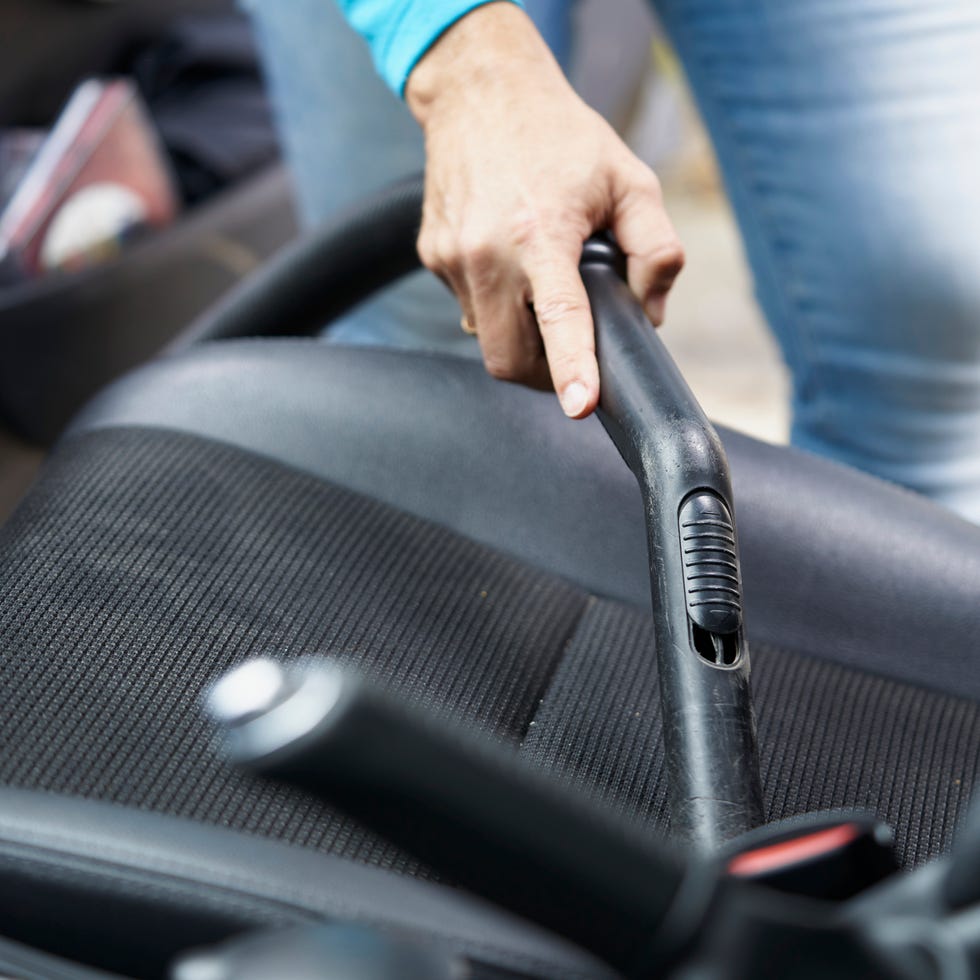
7. Do a full pass on the carpet.
Once the rest of the car’s interior is clean, vacuum the base carpet completely using the mini rotating brush attachment if your vacuum has one. If not, use the upholstery/brush tool. (You want to save this step for last, since debris may fall onto the floor during the cleaning process.) Use smaller nozzles to clean crevices, including seat tracks and even seat pockets.
After vacuuming, you may want to use your upholstery cleaner to tackle any stubborn spots you might have previously missed.
8. Wipe down the steering wheel and door handles.
Finally, since these high-touch areas can harbor germs and bacteria, spritz the steering wheel and all door handles with a disinfectant spray. Let sit for the time indicated on the manufacturer’s instructions and air dry, then buff with a microfiber cloth. For leather-covered steering wheels, use a disinfecting wipe.
Cleaning your car may seem like a daunting task, but here’s a bit of good news: It’s something you really only have to do about once per month . And if you’re diligent about regular maintenance cleaning, the task will become easier to tackle since you won’t have to do such a deep clean every time. Another nice bonus: When you have a clean car, it’s easier to maximize space, which means you’ll be able to fit more sports gear, groceries or whatever else you need to tote around town.
To minimize the amount of work you have to put in each time you clean your car’s interior, follow these tips to keep things in order:
- Don't eat in the car. This goes for both you and the kids — especially messy foods that crumble easily or sticky things like lollipops.
- Wipe down your pets' paws before placing them in the vehicle — and, if you have an SUV, consider securing pets safely in the cargo area. You might also want to keep a lint roller in the glove compartment to quickly tackle any pet hair each time your cat or dog rides with you.
- Keep a small trash can in the car for snack wrappers, empty cups and all of those pesky receipts that build up.
- Place protective car seat covers over the seats. If you have young kids, you can also get kick mats to place on the backs of the front seats to keep muddy footprints off the leather, vinyl or cloth seats.
- Apply a leather conditioner such as Furniture Clinic Leather Protection Cream , or a fabric protector such as Scotchgard Auto Fabric & Carpet Water Shield , to seats to help repel spills and make stains easier to remove.
Brigitt Earley is a seasoned freelance writer with extensive experience writing about consumer products, including household cleaning supplies. She's also a mom of four kids ages 3 through 6, so she's no stranger to a dirty car. To write this interior car cleaning guide, she worked under guidance from the experts in the Good Housekeeping Institute Home Care & Cleaning Lab.
Brigitt is a writer, editor and craft stylist with nearly 15 years of experience. She specializes in lifestyle topics, including home, health, parenting, beauty, style, food, entertaining, travel and weddings. She has written for Glamour, People, Good Housekeeping, Women's Health, Real Simple, Martha Stewart, Apartment Therapy, The Spruce, and more.

@media(max-width: 64rem){.css-o9j0dn:before{margin-bottom:0.5rem;margin-right:0.625rem;color:#ffffff;width:1.25rem;bottom:-0.2rem;height:1.25rem;content:'_';display:inline-block;position:relative;line-height:1;background-repeat:no-repeat;}.loaded .css-o9j0dn:before{background-image:url(/_assets/design-tokens/goodhousekeeping/static/images/Clover.5c7a1a0.svg);}}@media(min-width: 48rem){.loaded .css-o9j0dn:before{background-image:url(/_assets/design-tokens/goodhousekeeping/static/images/Clover.5c7a1a0.svg);}} Cleaning Tips & Advice

How to Make Your Kitchen Cabinets Shine

How to Clean a Mattress

Dyson 360 Vis Nav Robot Vacuum Review

Clothes Steamer vs. Iron: Which is Better?

The Best Irons for Clothes

The Best Washer and Dryer Combos

The Best Cleaning Products

The Best Car Upholstery Cleaners

The Best Mops

Are Earth Breeze Detergent Sheets Worth It?
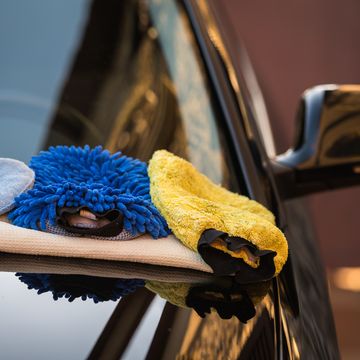
The Best Car Cleaning Kits

An official website of the United States government
Here’s how you know
Official websites use .gov A .gov website belongs to an official government organization in the United States.
Secure .gov websites use HTTPS A lock ( Lock A locked padlock ) or https:// means you’ve safely connected to the .gov website. Share sensitive information only on official, secure websites.
https://www.nist.gov/news-events/news/2024/05/nist-finalizes-updated-guidelines-protecting-sensitive-information
NIST Finalizes Updated Guidelines for Protecting Sensitive Information
- To do business with the federal government, contractors and other organizations are required to follow NIST guidelines for protecting the sensitive information they handle.
- NIST has updated these guidelines for consistency and ease of use.
- The final updates were based in part on feedback that users provided on earlier drafts published last year.

Contractors and other organizations that do business with the federal government now have clearer, more straightforward guidance for protecting the sensitive data they handle.
The National Institute of Standards and Technology (NIST) has finalized its updated guidelines for protecting this data, known as controlled unclassified information (CUI), in two publications: Protecting Controlled Unclassified Information in Nonfederal Systems and Organizations ( NIST Special Publication [SP] 800-171, Revision 3 ), and its companion, Assessing Security Requirements for Controlled Unclassified Information ( NIST SP 800-171A, Revision 3 ).
These guidelines require organizations to safeguard CUI such as intellectual property and employee health information. Systems that process, store and transmit CUI often support government programs involving critical assets, such as weapons systems and communications systems, which are potential targets for adversaries.
The two publications draw on NIST’s source catalog of security and privacy controls (NIST SP 800-53) and assessment procedures (NIST SP 800-53 A). Before this update, the wording of these documents did not match the language of the source catalogs, potentially creating ambiguity in the security requirements and uncertainty in security requirement assessments. The update is designed to address these issues and also streamline and harmonize NIST’s portfolio of cybersecurity guidance.
“For the sake of our private sector customers, we want our guidance to be clear, unambiguous and tightly coupled with the catalog of controls and assessment procedures used by federal agencies,” said NIST’s Ron Ross, one of the publications’ authors. “This update is a significant step toward that goal.”
NIST released draft versions of the guidelines for public comment last year. Ross said that the update acknowledges the community’s interest in making the safeguards available in machine-readable formats, such as JSON and Excel, which would benefit cybersecurity tool developers and implementing organizations. These alternate formats are now available through NIST’s Cybersecurity and Privacy Reference Tool .
“Toolmakers often want to import relevant sections of the guidance directly into an electronic form for easier reference and use,” he said. “Providing the guidance in these additional formats will allow them to do that. It will help a wider group of users to understand the requirements and implement them more quickly and efficiently.”
Additionally, to assist implementers already using Revision 2, NIST has issued an analysis of changes that details how each requirement has evolved.
The companion publication, SP 800-171A, is designed to help users assess the security requirements in SP 800-171 to determine if the requirements have been met. The publication includes a complete set of updated assessment procedures that correspond to the changes to the security requirements as well as new material to illustrate how to conduct security requirement assessments.
In the coming months, NIST plans to revise other supporting publications on protecting CUI associated with high-value assets and critical programs. These forthcoming updates will include NIST SP 800-172 (enhanced security requirements) and NIST SP 800-172A (enhanced security requirement assessments).
Read more about the release at the NIST Computer Security Resource Center .
National Geographic content straight to your inbox—sign up for our popular newsletters here

How to visit Japan's shrines and temples—with respect
Why are there Buddhas hidden in some Shinto shrines? Why do temples and shrines often share the same grounds? These sacred spaces have a compelling history.
Over the centuries, the Indigenous Shinto religion and Buddhism, imported from India by way of China, gained prominence in Japan at different times. From the beginning, beliefs intermingled, creating what’s now called shinbutsu shugo . Then, from the end of the 19th century through the first half of the 20th, government policy sought to split the two in an effort to elevate Shinto.
Traces of this history can still be seen all over Japan, from Buddha statues hidden in Shinto shrines in response to Meiji policy, to Shinto imagery at Buddhist temples. In many places, Shinto and Buddhism, with their associated structures, shrines and temples respectively, share the same sacred grounds. Today, there are about 80,000 shrines and 77,000 temples in the country.
As travel to Japan surpasses pre-pandemic levels , visitors who know just a bit of this context can more deeply appreciate these sacred sites. Here are some key histories, symbols, and etiquette to keep in mind to ensure a respectful and enriching visit.

Look out for these features
How do you tell if you’re at a temple or a shrine? The clue is in the name: temples often have the suffix “寺” (-ji or -tera) or “院” (-in), while shrines usually use “神社” (-jinja) or “宮” (-miya or -gu).
Torii , Sanmon and Romon gates: Both shrines and temples have gates. At the entrance to shrines is the torii, which stands open and consists of two posts and one or two upper lintels. At temples, the gate is called sanmon or romon, and is often more functional in that they can be closed. “Both torii and sanmon serve as barriers, symbolically separating the secular world from the sacred realm,” says Toyohiko Ikeda, head priest at Sugawara Shrine in Machida, Tokyo.

Shimenawa : At shrines, you may see a shimenawa, a rope made from rice straw or hemp and accented with paper zigzag. “Its presence signifies that the enclosed area is in a sacred and pure state,” says Takeyoshi Nagai, head priest of Hibita Shrine in Isehara, Kanagawa. But shimenawa are not limited to shrines. You may have seen them on an especially impressive rock in the forest, or even wrapped around sumo wrestlers, especially the yokozuna, or highest ranked wrestlers. “This tradition is believed to be a way for the yokozuna, who perform the stomp before entering the ring, to dispel evil spirits.”
Komainu and Nio guardians: What of the fierce guardians in front of both shrines and temples? At shrines, more often you’ll find komainu, or lion-dogs, while at temples, you’ll likely find Nio statues, fearful warrior types. “Komainu and Nio statues have the role of warding off malevolent forces attempting to enter,” says Ikeda. Both kinds of guardians are usually depicted with one of the pair having an open mouth and the other with a closed mouth, symbolizing the vocalization of “ aum .”
Bells: Inside temple grounds you’ll sometimes find a bell tower containing a large bronze bell. “In the old days, when there were no clocks in every home, the bells were used to tell the time to local people,” says Kohei Uchida, the head monk at Shingyoji in Matsue, Shimane. The bells are also used to call monks to prayer. If you visit at temple at midnight on New Year’s Eve, you might hear the “Joya no kane,” the ringing of the bell 108 times to symbolize letting go of the 108 earthly desires and approaching the new year with a pure heart.
Except for shimenawa and torii, versions of these features were all imported from abroad, though of course each culture’s version has its own unique flavor.

Approaching sacred spaces as a traveler
Regardless of religion, any traveler can visit both temples and shrines, says Uchida. However, there are some places that are off limits in both shrines and temples, often with sacred images or objects that are tended only by staff. Photography is frowned upon at some temples and shrines, and allowed in others. If in doubt, it’s best to check with the staff. In shrines, talking should be kept to a minimum, says Ikeda, though children up to the age of seven are considered divine and their making noise is generally acceptable.
When approaching a temple or shrine, the center of the path is reserved for the gods, so mortals should keep to the edge of the walkway. At the gate, it’s customary to offer a greeting to the gods with a slight bow. Before entering the inner precinct, shrines and some temples have a temizuya , a small pavilion with sacred water for ritually cleansing your hands and mouth. Visitors should take care not to let any water they’ve touched go back into the basin, but rather let it run onto the ground. “This act is to cleanse the mind and body, as it is believed that without purification, the gods may not take notice of us,” says Ikeda.
In both cases, non-adherents are welcome to pray, according to Uchida and Ikeda, though the method of prayer differs between temples and shrines. “First visit the main hall of the temple, where the principal image resides,” says Uchida. If there is incense, you can burn some, then place your hands together in silent prayer. At shrines, the ritual for prayer is to bow twice, clap twice, pray, and then bow once more.
But when it comes to visiting shrines or temples, there’s no need to choose. The mixing and matching are an integral part of the culture.
“In Japan, people have cherished both Shinto and Buddhism alike,” says Nagai. “The innate connection to the natural world in Shinto and the structured practices of Buddhism found common ground, fostering a coexistence of the two belief systems.”

Shinto and Buddhism: blurred lines
When Buddhism arrived in the 6th century, beliefs and rituals now known as Shinto were already in Japan. Shinto gods, called kami , include mythological creation gods, deities that control events like rain and rice harvests, as well as spirits that inhabit objects and animals. Evidence of these Indigenous practices, though diffuse, can be traced as far back as around 300 B.C.
Buddhism’s more organized doctrine brought the construction of temples, and Shinto shrines soon followed in their footsteps.
Importantly, neither Buddhism nor Shinto inherently demands that its followers adhere to only one faith. “Shinto is an everyday faith woven into daily life,” says Ikeda. “Within the Buddhist teachings, there was a concept of salvation not found in Shinto.”
This appealed to people, and as Buddhism spread, so did shinbutsu shugo, or the amalgamation of Shinto and Buddhism. In some cases, kami were explained as Buddhas in “disguise,” says Erik Schicketanz , professor of religious studies specializing in Buddhism at Kokugakuin University.
In other cases, kami were recruited as protectors of temples and monasteries, which is why you often see shrines and temples side by side, or even within the same compound. Tokyo’s most famous temple, Sensoji, is an example of this, says Schicketanz. “Right next to Sensoji is the Asakusa Jinja. And that is not by coincidence, because until 1868 they were the same thing.”
1868 brought the Meiji Restoration, a new government in pursuit of a pure national identity. They rolled out a policy of shinbutsu bunri , or the separation of Shinto from Buddhism, and an attempt to elevate Shinto as a state religion.
The legal separation continued until 1945, and in that time, Shinto grew as an overall framework, says Schicketanz. During the period of separation, some temples and Buddhist images were destroyed, and monks were forced to give up their positions or become Shinto priests. Because of the policy of Shinto supremacy, it’s rarer to find Buddhist elements at shrines than vice versa.
Nowadays, a significant number of people claim no specific religious affiliation, says Nagai. “However, for those who do express a religious belief, Buddhism and Shinto are often held in nearly equal regard.”
Related Topics
- RELIGIOUS TRAVEL
- FOLK RELIGION
You May Also Like

Temples, meditation and contemplation: staying with monks on Japan's holy Koyasan

Done the Camino? Try tackling Japan’s 88-temple Shikoku Trail
For hungry minds.
How these Japanese prayer plaques became symbols of hope

Open a portal to the underworld at these Buddhist ‘hell parks’

Inside the new Japanese island retreat where wellness is inspired by Zen Buddhism

This ancient Dutch goddess was nearly lost to time—and rising seas

Photo story: a pilgrimage to the rock-hewn temples of Hampi, India
- Paid Content
- Environment
- Photography
- Perpetual Planet
History & Culture
- History Magazine
- History & Culture
- Mind, Body, Wonder
- Terms of Use
- Privacy Policy
- Your US State Privacy Rights
- Children's Online Privacy Policy
- Interest-Based Ads
- About Nielsen Measurement
- Do Not Sell or Share My Personal Information
- Nat Geo Home
- Attend a Live Event
- Book a Trip
- Inspire Your Kids
- Shop Nat Geo
- Visit the D.C. Museum
- Learn About Our Impact
- Support Our Mission
- Advertise With Us
- Customer Service
- Renew Subscription
- Manage Your Subscription
- Work at Nat Geo
- Sign Up for Our Newsletters
- Contribute to Protect the Planet
Copyright © 1996-2015 National Geographic Society Copyright © 2015-2024 National Geographic Partners, LLC. All rights reserved
You're watching the 'Bridgerton' seasons and the 'Queen Charlotte' spinoff in the wrong order
- "Bridgerton" season three premieres on May 16.
- But it's actually the fourth season in the "Bridgerton" universe if you count "Queen Charlotte."
- The ideal watching order is counterintuitive — you should intersperse the main show with the spinoff.

"Bridgerton" is returning with its third season, but viewers watching the franchise in release order are missing a beat.
The series, which premiered in 2020, quickly became one of the most-watched on Netflix as viewers were captivated by the bright, escapist drama set in 19th-century London.
The success of the first season prompted a whole franchise with more seasons plus a spin-off show, " Queen Charlotte: A Bridgerton Story ."
Most fans have been watching the show in release order, but we think there is a better way.
Season 1 is still the perfect introduction to the "Bridgerton" world.
Though "Queen Charlotte: A Bridgerton Story" is a prequel to the main "Bridgerton" series, it's not a great place to start. The prequel assumes prior knowledge of the shows.
Though it's not impossible to start with Queen Charlotte, we think "Bridgerton" season one is still the best opener.
Lady Whistledown , the anonymous gossip who narrates the show, spends much of the first two episodes establishing the world and explaining the rules of London society.
We meet the most important characters of London high society, including the Bridgertons and Featheringtons, Lady Danbury (Adjoa Andoh), and Queen Charlotte (Golda Rosheuvel).
We follow the show's pivotal first love story between Daphne Bridgerton (Phoebe Dynevor) and Simon Hastings (Regé Jean-Page), the rakish Duke of Hastings with a big secret.
We get the first hint of trouble in the royal household in episode five, which sets up the "Queen Charlotte" spinoff after you finish season one.
You should then watch the first 4 episodes of "Queen Charlotte: A Bridgerton Story."
This is where to divert from the release order.
"Queen Charlotte: A Bridgerton Story" is a limited miniseries covering the younger years of Queen Charlotte, played here by India Amarteifio.
This is where she meets King George III (Corey Mylchreest), marries him, and adjusts to life as an English monarch.
It is great context for George's later erratic behavior, which looms over the main narrative. It also explains how Charlotte, a Black woman, enters London's high society and begins the transformation to the more diverse nobility we see in the main show.
Elsewhere in the series, we also see the youths of Lady Danbury (Arsema Thomas), the social scene's most respected widow, and Lady Bridgerton (Connie Jenkins-Greig), the matriarch of the Bridgerton family, which provides a lot of context for their future selves.
The prequel does have some scenes set after "Bridgerton" season two in the timeline, and there are small hints as to what happens, but not too many major spoilers.
Moments like the Queen grieving her living husband and Lady Bridgerton grieving her dead husband deliver better insight into these characters and a better narrative arc.
It's time to go back to "Bridgerton" season two to see Anthony Bridgerton's love story.
Season two is set a year after season one and follows Daphne's oldest brother, Anthony Bridgerton (Jonathan Bailey), as he tries to find a wife.
He chooses Edwina Sharma (Charithra Chandran), the Queen's favored debutante, but clashes with her older sister, Kate Sharma (Simone Ashley).
This season finally explains what happened to the Bridgertons' former patriarch and Violet's former husband, Edmund Bridgerton (Rupert Evans). Lady Danbury and Queen Charlotte interact more, following their friendship in "Queen Charlotte."
The Queen spends most of this season hunting for Lady Whistledown's identity.
Then back to the final two episodes of "Queen Charlotte" for more context (and maybe the "Queen Charlotte" book).
After King George's brief cameo in "Bridgerton" season two, the final two episodes of "Queen Charlotte" make a nice conclusion to the love story between the two.
When I watch "Queen Charlotte," the final two episodes strike me as a self-contained unit. This part explores Lady Danbury's love life and reveals an important detail about Lady Bridgerton, which may be useful for season three.
You should also read the "Queen Charlotte" tie-in book, the only "Bridgerton" book written by Julia Quinn after the release of the TV series.
The main Netflix series adapts Quinn's "Bridgerton" books — but "Queen Charlotte" is different.
Quinn told Business Insider that the 2023 book is informed by the scripts for the TV series, meaning their plots align more closely.
Now you are ready to watch Penelope and Colin fall in love in "Bridgerton" season three.
The latest "Bridgerton" season follows Colin Bridgerton (Luke Newton), the third Bridgerton sibling, as he returns from traveling and is keen to reunite with his friend and neighbor Penelope Featherington (Nicola Coughlan). Unfortunately, she rebuffs him and says she's focused on finding a husband.
To win her attention, Colin agrees to teach Penelope how to seduce a man, which allows the pair to become closer.
Elsewhere, the Queen is trying to find a new interest, Lady Bridgerton is nearing a romance of her own, and Francesca Bridgerton (Hannah Dodd) is making her debut in London society.
- Main content

IMAGES
COMMENTS
Having the money to take a family on an international trip every year plus buy a Chanel bag means rich to 90% of the world. 2-3 international trips a year every 3-4 months and domestic travel in between. Literally feel incomplete if i dont have a trip booked. Up until Covid I would work 9 months then travel for 3.
Ideally, you should take at least two longer trips per year, in addition to a few other smaller trips. The total amount that you should spend on vacation is 30-45 days per year. I know getting one month off per year can seem hard for some, but it's a very effective way to stay healthy, live happier, and longer.
Still, international travel by Americans remains far below pre-pandemic levels. How we did this To provide context for the impact of the COVID-19 pandemic on international travel, this post looks at the habits of Americans when it comes to who most frequently goes abroad, as well as those groups in the U.S. who have been less likely to do so.
We know that in terms of maximizing relaxation, you should aim for vacations that range somewhere between seven and 11 days long. That gives you enough time to let go of your stress at work ...
Due to the mechanised nature of the living styles, people easily get bored. The seek ways to get relief and travelling is one of the best ways for relaxation. Apart from that digital media let people know about the places they should visit. Finally, the cheap and easy air flights attract more people to visit new places.
Sample Answers. 1. Do you like travelling? Sample 1: Yes, definitely! I think seeing the world, from great historical monuments to white sandy beaches, is what life is all about. It's a very interesting way to learn about new cultures and explore new places. Sample 2: Absolutely!
7 Do you often travel abroad? I haven't travelled abroad yet. First I want to tour all places within my country. ... 4 Do you think travel can (or, does) change people's ways of thinking? I think travel has made people better communicators. It has allowed people to be more patient. Through travelling, people can get to know a lot more about ...
Travel. Q. Do you often travel abroad? A. Not much, to be honest. I don't get many days off in a year but when I do have time off, I mainly spend that time with my family in my hometown. Q. When is the best season to travel in your country? A. I guess it would be spring. That's when the weather starts warming up and all the flowers start ...
Q1. Do you often travel abroad? Well, to be honest, I do not get much free time from my studies/ work, but when I get free time, I mostly spend that time with my family and friends in my hometown. Q2. When is the best season to travel in your country? It is a difficult question to answer because each traveller has their preference.
1. Yes, I really like traveling because when I travel I can see fascinating, exotic countries and try all kinds of delicious dishes. 2. Yes, I've always loved traveling. I've already been to most of the countries in Europe and I'd like to travel around South America. I'm a big fan of Latin American culture, music, and cuisine.
Do NOT state, "for example…, or for instance…" *Instead, just give your example. PART 1 (Sample Response - CD2 Track 8) Let's talk about travelling. When is the last time you went on a trip? The last time I had the opportunity to do some travelling was back in 2019 March when I went skiing in Slovenia with my in-laws.
1. Do you like travelling? Of course I do. In fact, I think of travelling as an escape from the mundanity of my everyday life. You know, if your day only revolves around studying or working, very soon you're gonna go insane; that's why an annual or even monthly dose of travel experiences is what you should consider. 2. How often do you go ...
How often do you travel away from your city? I frequently journey out of town, away from Victoria where I live, I would say at least five to ten times each month as I have friends and relatives living in many different places on Vancouver Island, and I love to go visit them.
Usage and Examples. Beginner ESL students can answer "How often do you" questions by using the present simple tense, which is used to describe regular activities or habits. The basic grammatical structure is "subject + present tense verb + adverb of frequency + object.". How often do you go to the gym? I go to the gym three times a week.
How often do you travel away from your city? I frequently journey out of town, away from Victoria where I live, I would say at least five to ten times each month as I have friends and relatives living in many different places on Vancouver Island, and I love to go visit them.
Answer 1: Well, as long as people take care of their surroundings and keep their personal trash at a minimum, then traveling can be an acceptable way to enjoy our time. We need to be more environmentally conscious when picking our destinations and how often we travel, that's for sure. My Personal Answer:
travelling alone and in groups. Trong bài viết này, IELTS Thanh Loan xin gợi ý với bạn những ý tưởng thông dụng nhất về 2 vấn đề, đó là: " frequency " và " travelling companion ". 1. Frequency. Well, I do some travelling on a monthly basis in order to escape from the hustle and bustle of the city.
If you include weekend camping trips, it's almost every weekend. Usually once a month. A mix of work and recreational travel, but I work in tourism so the work trips are pretty fun too. 3-4 big international trips per year, and then maybe 1-2 domestic trips per year. Well, here are results from a survey from r/travel.
Yet, the common thread in both scenarios is the frequency of travel. With only 365 days in a year, encompassing studies, work, family, and more, how often do we truly set aside time to explore? For me, the desire to travel is a constant whisper, though the realities of everyday life often temper its fulfillment.
You should say: where you went. how you travelled. why you made the journey. and explain why you remember this journey well. [You will have to talk about the topic for one to two minutes. You have one minute to think about what you are going to say. You can make some notes to help you if you wish.]
Once male and female periodical cicadas have mated and the latter has laid its eggs, the insects will die after spending only a few weeks above ground − anywhere from three to six weeks after ...
Why You Can't Sleep When Traveling. When we travel, our sleep is often one of the first things to suffer, and the reasons are multifaceted. Dr. Rebecca Robbins, a member of the Health Advisory ...
The Federal Reserve has opted to keep the federal funds rate at a range of 5.25% to 5.50% at its last six meetings. As a result you can still find high-yield savings accounts with APYs as high as ...
Britain will hold a national election on July 4 which opinion polls indicate will end 14 years of Conservative Party-led government, spanning one of the most turbulent periods in the country's ...
7. Do a full pass on the carpet. Once the rest of the car's interior is clean, vacuum the base carpet completely using the mini rotating brush attachment if your vacuum has one. If not, use the ...
May 14, 2024. To do business with the federal government, contractors and other organizations are required to follow NIST guidelines for protecting the sensitive information they handle. NIST has updated these guidelines for consistency and ease of use. The final updates were based in part on feedback that users provided on earlier drafts ...
At shrines, the ritual for prayer is to bow twice, clap twice, pray, and then bow once more. But when it comes to visiting shrines or temples, there's no need to choose. The mixing and matching ...
You should also read the "Queen Charlotte" tie-in book, the only "Bridgerton" book written by Julia Quinn after the release of the TV series. The main Netflix series adapts Quinn's "Bridgerton ...
There is no rule or law that determines that voting day must be a public holiday. However, President Cyril Ramaphosa has, in terms of Section 2A of the Public Holidays Act (Act No 36 of 1994 ...